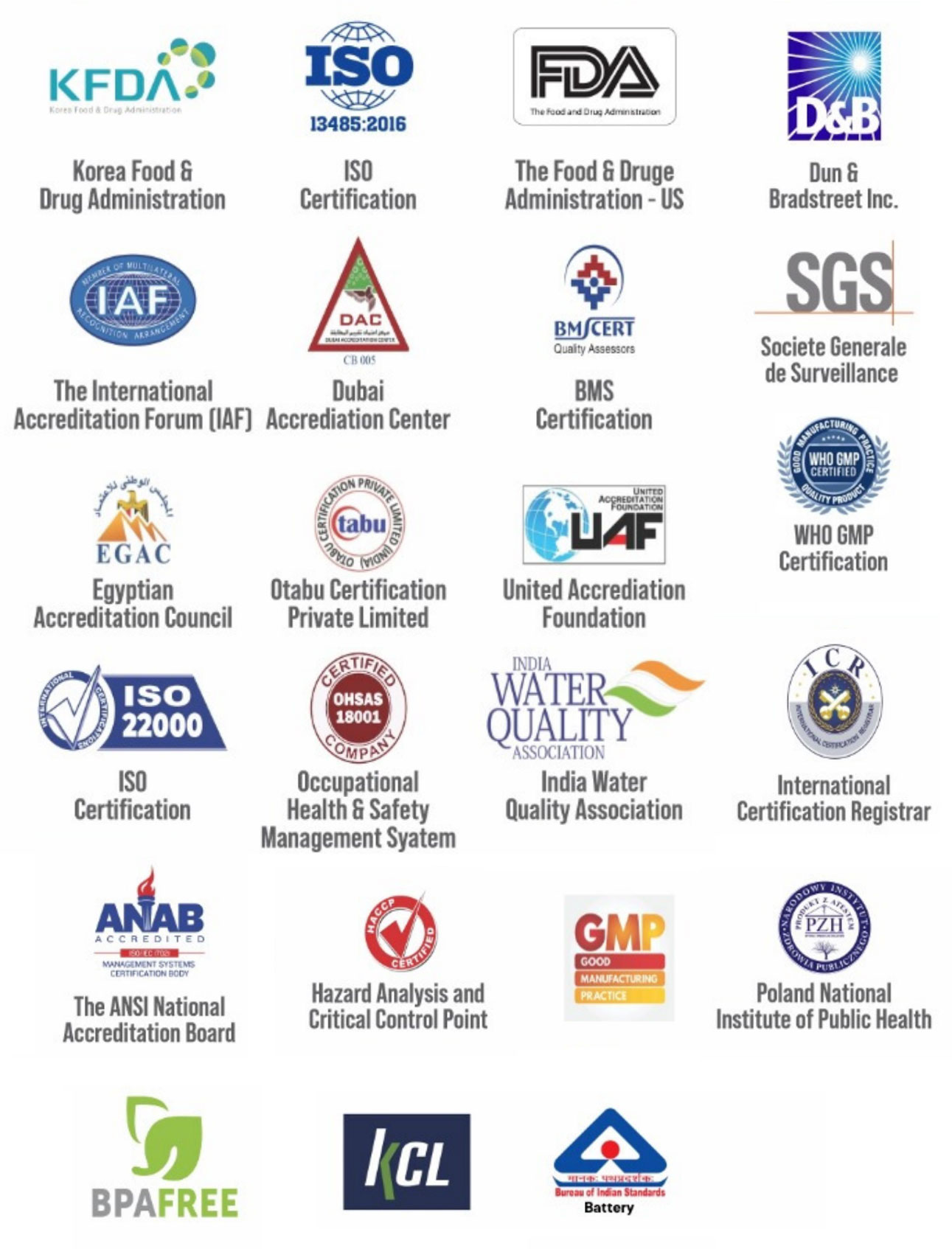

Carrot
38

Apple
516

Banana
756

Equal to 1.5 Ltr
HYDROGENIX Hydrogen Water

Spinach
45

Pumpkin
3.7
Hydrogen & Alkaline Drinking Water Machines
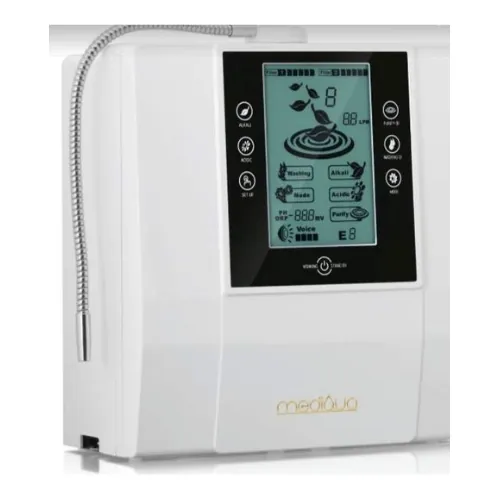
Mediqua Ak 2000-7
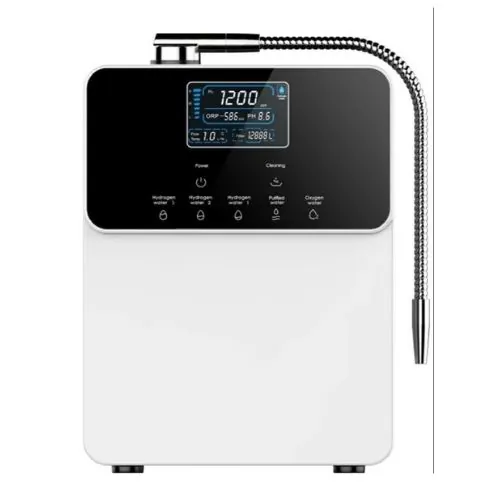
X Factor 1+ with heater
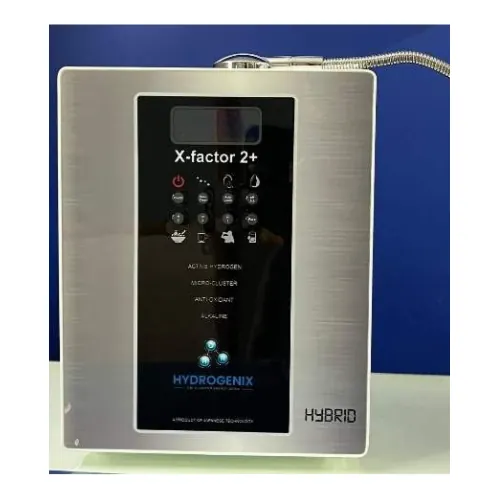
X Factor 2+
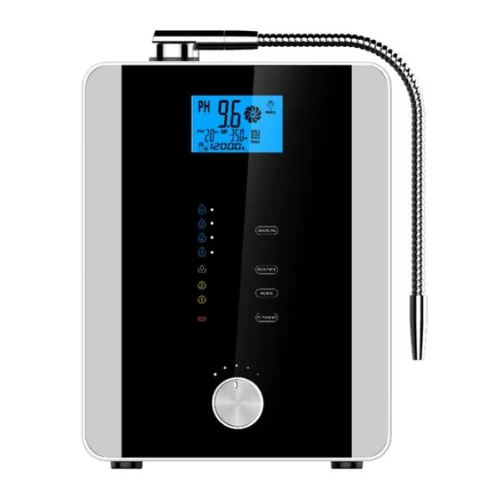
X Factor 4+
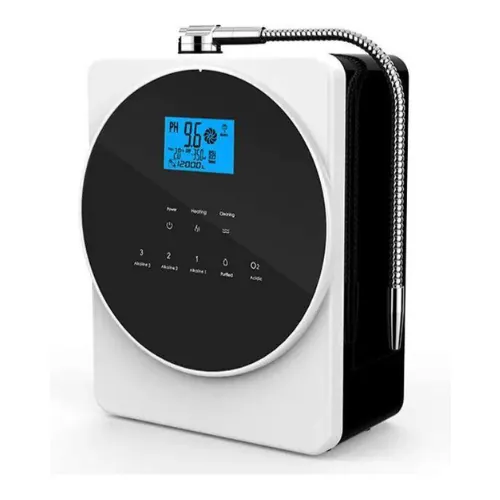
X-Factor 3+ with heater
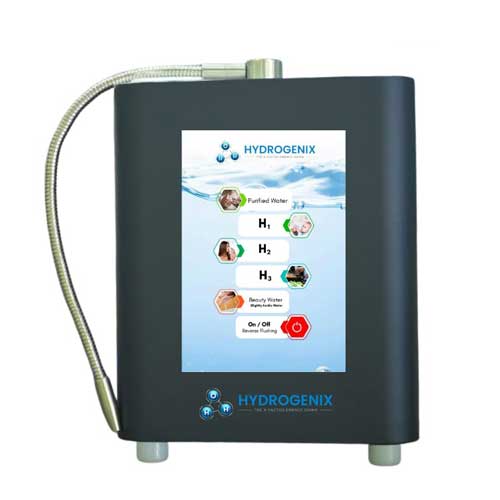
XT-501
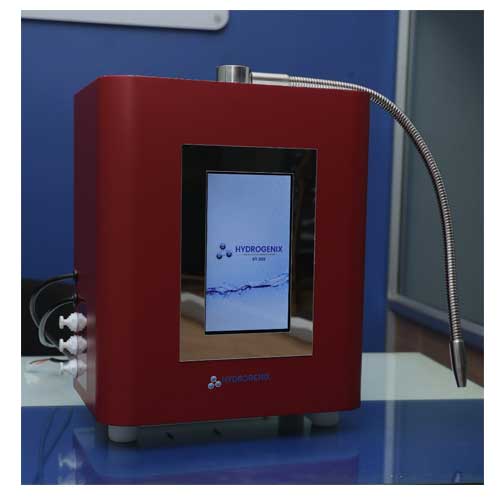
XT-502
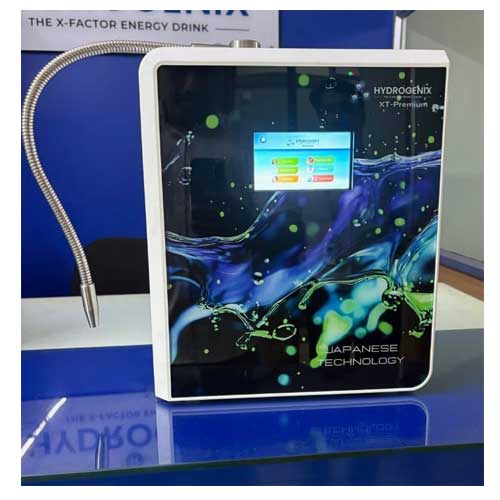
XT-Premium

XT-1001
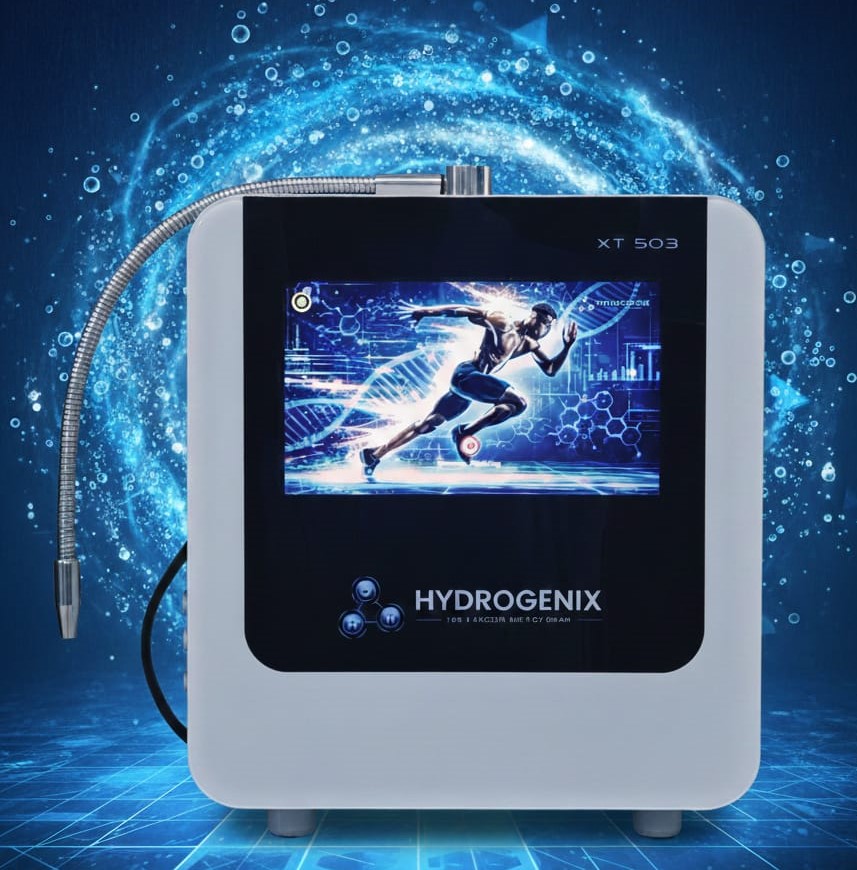
XT-503
Features of HYDROGENIX Hydrogen Water

ANTI-AGING

BOOSTER ENDURANCE
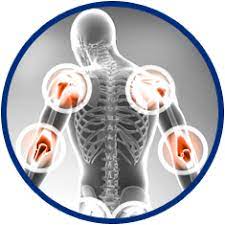
REDUCE LACTIC ACID

REDUCE FATIQUE

PREVENT 170+ LIFESTYLE DISEASES

REDUCE INFLAMMATION FROM EXERCISE

DELIVER POWERFUL ANTI OXIDANTS

INCREASE POWER STAMINA & ENERGY
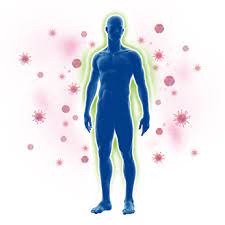
IMMUNITY BOOSTER

IMPROVE ATHLETIC PERFORMANCE

REDUCE WRINKLING EFFECT

REDUCE OBESITY

Get Our Exclusive Offer.
Causes of Ageing and Disease

Causes of Ageing and illness?
To review the recent research results, we can summarize the following 3 points
- The basic cause of Aging and illness is due to cell damage.
2. The cause of cell damage is harmful oxygen free radicals.
3. 90 % of all diseases are caused by harmful oxygen free radicals as a major cause of Cell Damage.
→ Cell damage due to harmful oxygen free radicals is the major cause of aging and disease
Representative diseases caused by harmful oxygen free radicals
| Department | Representative diseases |
|---|---|
| Tumor system | Cancer caused by smoking, chemical carcinogenesis, radiation cancer |
| The digestive system | Gastritis, stomach ulcer, cancer of the stomach, cirrhosis, Crohn’s disease, pancreatitis |
| Integumentary System | Atopic dermatitis, dermatitis solaris, photosensitivity disease |
| Hematometer | Leukemia, septicaemia, hyperlipidemia |
| Endocrine system | Diabetes, adrenal, disturbances of metabolism |
| Dermatitis | cataract, Retinal degeneration |
| Connective-tissue system | Articular rheumatism, auto-immune disease, collagen disease |
| Circulatory system/ Respiratory organ | Myocardial infraction, artery hardening, pneumonia, angina |
| Brain-nervous system | Cerebral infarction, epilepsy, cerebral haemorrhage, Parkinson’s disease, autonomic disturbance |
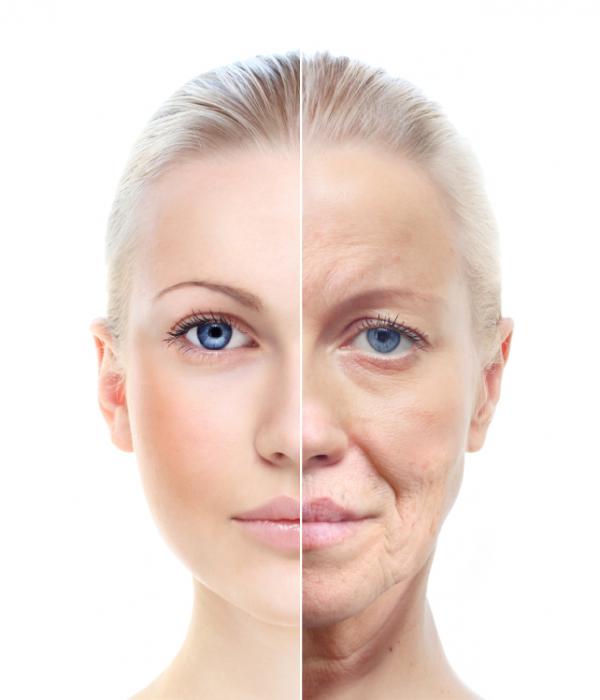
* All diseases (90%) are affected by harmful oxygen free radicals. About 10% of them are caused by bacterial and viral diseases or infections.
* Germ diseases increase faster in the interior of the body when harmful oxygen free radicals increase – Johns Hopkins University School of Medicine, 1991.
What are harmful oxygen free radicals?
The breathing oxygen around 2 ~ 3% turns into oxygen free radical, which produces good active oxygen and Harmful oxygen free radical.
※ Breathe more than 20,000 times a day on average, more than 1 million liters of air is released through the respiration, and oxygen absorbed by double breathing is about 1500 liters, In other words, Our body produces oxygen free radical of 30 liters every day. (Gale Encyclopedia of Medicine, 2008) –
There are 4 types of oxygen free radicals (Superoxide radical, Hydrogen peroxide, Singlet oxygen, Hydroxy radical)
- The basic cause of Aging and illness is due to cell damage.
- The cause of cell damage is harmful oxygen free radicals.
- 90 % of all diseases are caused by harmful oxygen free radicals as a major cause of Cell Damage.
- The hydroxyl radical is the most active one causing cell damages of those oxygen free radicals.

Get Our Exclusive Offer.
Scientific Studies
- Bones
- Brain
- Cancer
- Aging
- Allergies
- Athletic Performance & Recovery
- Autoimmune Disease
- Colitis
- Diabetes (Type 1)
- Rheumatoid Arthritis
- Bone Health
- Brain Injury
- CTE / Concussion
- Cardiovascular Disease
- Atherosclerosis
- Blood Clots
- Cholesterol Balance
- Hypertension Regulation
- Heart Attack
- Stroke
- Cognitive Performance & Recovery
- Diabetes (Type 2)
- Depression
- General Health
- Kidney Disease
- Liver Disease (Cirrhosis)
- Lung Disease
- Metabolic Syndrome
- Mitochondrial Myopathies / Muscular Dystrophy
- Amyotrophic Lateral Sclerosis (ALS)
- Parkinson’s Disease
- Fertility
- Pregnancy
- Skin Conditions
Li, J., et al., Protective effects of molecular hydrogen on steroid-induced osteonecrosis in rabbits via reducing oxidative stress and apoptosis. BMC Musculoskelet Disord, 2017. 18(1): p. 58.
Guo, J., et al., Hydrogen-rich saline prevents bone loss in diabetic rats induced by streptozotocin. Int Orthop, 2017. 41(10): p. 2119-2128.
Yamada, T., et al., Hydrogen supplementation of preservation solution improves viability of osteochondral grafts. ScientificWorldJournal, 2014. 2014: p. 109876.
Wan, W.L., et al., An In Situ Depot for Continuous Evolution of Gaseous H2 Mediated by a Magnesium Passivation/Activation Cycle for Treating Osteoarthritis. Angew Chem Int Ed Engl, 2018.
Ostojic, S.M., et al., Effectiveness of oral and topical hydrogen for sports-related soft tissue injuries. Postgrad Med, 2014. 126(5): p. 187-95.
Sun, Y., et al., Treatment of hydrogen molecule abates oxidative stress and alleviates bone loss induced by modeled microgravity in rats. Osteoporos Int, 2013. 24(3): p. 969-78.
Li, D.Z., et al., Treatment with hydrogen molecules prevents RANKL-induced osteoclast differentiation associated with inhibition of ROS formation and inactivation of MAPK, AKT and NF-kappa B pathways in murine RAW264.7 cells. J Bone Miner Metab, 2013.
Guo, J.D., et al., Hydrogen water consumption prevents osteopenia in ovariectomized rats. Br J Pharmacol, 2013. 168(6): p. 1412-20.
Cai, W.W., et al., Treatment with hydrogen molecule alleviates TNFalpha-induced cell injury in osteoblast. Mol Cell Biochem, 2013. 373(1-2): p. 1-9.
Xu, Z., et al., Anti-inflammation effects of hydrogen saline in LPS activated macrophages and carrageenan induced paw oedema. J Inflamm (Lond), 2012. 9: p. 2.
Takeuchi, S., et al., Hydrogen may inhibit collagen-induced platelet aggregation: an ex vivo and in vivo study. Internal Medicine, 2012. 51(11): p. 1309-13.
Lekic, T., et al., Protective effect of hydrogen gas therapy after germinal matrix hemorrhage in neonatal rats.. Acta Neurochir Suppl, 2011. 111: p. 237-41.
Kubota, M., et al., Hydrogen and N-acetyl-L-cysteine rescue oxidative stress-induced angiogenesis in a mouse corneal alkali-burn model. Investigative Ophthalmology and Visual Science, 2011. 52(1): p. 427-33.
Itoh, T., et al., Molecular hydrogen inhibits lipopolysaccharide/interferon gamma-induced nitric oxide production through modulation of signal transduction in macrophages. Biochemical and Biophysical Research Communications, 2011. 411(1): p. 143-9.
Hanaoka, T., et al., Molecular hydrogen protects chondrocytes from oxidative stress and indirectly alters gene expressions through reducing peroxynitrite derived from nitric oxide. Medical Gas Research, 2011. 1(1): p. 18.
Kawasaki, H., J.J. Guan, and K. Tamama, Hydrogen gas treatment prolongs replicative lifespan of bone marrow multipotential stromal cells in vitro while preserving differentiation and paracrine potentials. Biochemical and Biophysical Research Communications, 2010. 397(3): p. 608-613.
A variety of studies shown strong potential for H2 to be a highly effective and easily administered treatment of traumatic brain injury and concussion, and potentially in cases of CTE. In one study, a treatment with H2 water reduced the acute changes induced controlled cortical impact (CCI) by about half and completely blocked pathological tau expression.
Hydrogen is neuroprotective against surgically induced brain injury
“Hydrogen appears to be promising as an effective, yet inexpensive way to reduce cerebral edema caused by surgical procedures. Hydrogen has the potential to improve clinical outcome, decrease hospital stay, and reduce overall cost to patients and the health care system.”
Hydrogen acts as a therapeutic antioxidant by selectively reducing cytotoxic oxygen radicals
“Hydrogen selectively reduces the hydroxyl radical, the most toxic free radical, and effectively protects cells. It does not react with free radicals that have physiological benefits, making it an incredibly effective therapy to neutralize acute oxidative stress.”
Hydrogen-rich saline alleviates early brain injury via reducing oxidative stress and brain edema following experimental subarachnoid hemorrhage in rabbits
“The results suggest that treatment with hydrogen in experimental SAH rabbits could alleviate brain injury via decreasing the oxidative stress injury and brain edema. Hence, we conclude that hydrogen possesses the potential to be a novel therapeutic agent for EBI after SAH.”
H2 prevents oxidative stress and regulates gene expression and also alleged symptoms from radiation therapy. H2 has also been shown to halt tumor growth and convert cancer cells back to normal cells due to its selective free radical scavenging ability. Significant benefits have been demonstrated for a number of different cancers, including liver, tongue, and colon cancer cells.
Hydrogen as a selective antioxidant: A review of clinical and experimental studies
“H2 is emerging as a novel and safe therapeutic antioxidant. It has selective antioxidant properties, giving it anti-inflammatory properties.
Effects of drinking hydrogen-rich water on the quality of life of patients treated with radiotherapy for liver tumors
“The consumption of hydrogen-rich water for 6 weeks reduced reactive oxygen metabolites in the blood and maintained blood oxidation potential. QOL scores during radiotherapy were significantly improved in patients treated with hydrogen-rich water compared to patients receiving placebo water. Daily consumption of hydrogen-rich water is a potentially novel, therapeutic strategy for improving QOL after radiation exposure. Consumption of hydrogen-rich water reduces the biological reaction to radiation-induced oxidative stress without compromising anti-tumor effects.”
Molecular hydrogen as an emerging therapeutic medical gas for neurodegenerative and other diseases
“Effects of molecular hydrogen on various diseases have been documented for 63 disease models and human diseases in the past four and a half years. Six human diseases have been studied to date: diabetes mellitus type 2, metabolic syndrome, hemodialysis, inflammatory and mitochondrial myopathies, brain stem infarction, and radiation-induced adverse effects.”
Hydrogen as a selective antioxidant: A review of clinical and experimental studies
“H2 is emerging as a novel and safe therapeutic antioxidant. It has selective antioxidant properties, giving it anti-inflammatory properties.”
Effects of drinking hydrogen-rich water on the quality of life of patients treated with radiotherapy for liver tumors
“The consumption of hydrogen-rich water for 6 weeks reduced reactive oxygen metabolites in the blood and maintained blood oxidation potential. QOL scores during radiotherapy were significantly improved in patients treated with hydrogen-rich water compared to patients receiving placebo water. Daily consumption of hydrogen-rich water is a potentially novel, therapeutic strategy for improving QOL after radiation exposure. Consumption of hydrogen-rich water reduces the biological reaction to radiation-induced oxidative stress without compromising anti-tumor effects.”
Molecular hydrogen as an emerging therapeutic medical gas for neurodegenerative and other diseases
“Effects of molecular hydrogen on various diseases have been documented for 63 disease models and human diseases in the past four and a half years. Six human diseases have been studied to date: diabetes mellitus type 2, metabolic syndrome, hemodialysis, inflammatory and mitochondrial myopathies, brain stem infarction, and radiation-induced adverse effects.”
Hydrogen acts as a therapeutic antioxidant by selectively reducing cytotoxic oxygen radicals
“Hydrogen selectively reduces the hydroxyl radical, the most toxic free radical, and effectively protects cells. It does not react with free radicals that have physiological benefits, making it an incredibly effective therapy to neutralize acute oxidative stress.”
Recent progress toward hydrogen medicine: Potential of molecular hydrogen for preventive and therapeutic applications
“H2 prevented the decline of the mitochondrial membrane potential. This suggested that H2 protected mitochondria from OH. Along with this protective effect, H2 also prevented a decrease in the cellular level of ATP synthesized in mitochondria. The fact that H2 protected mitochondria and nuclear DNA provided evidence that H2 penetrated most membranes and diffused into organelles.”
Platinum nanocolloid-supplemented hydrogendissolved water inhibits growth of human tongue carcinoma cells preferentially over normal cells
“Anti-cancer activity of Pt-nc-supplemented HD-water was shown by its preferential cell-growth inhibition to human tongue carcinoma cells HSC-4 over normal human tongue cells DOK, and might be partly attributed to HD-water-caused enhancement of Pt-nc-relevant antioxidant ability. Pt-nc-supplemented HD-water is expected as a novel agent against human tongue cancers due to its cancer progression-repressive abilities.”
Neutral pH hydrogen-enriched electrolyzed water achieves tumor-preferential clonal growth inhibition over normal cells and tumor invasion inhibition concurrently with intracellular oxidant repression
“NHE water diminished hydroxyl radicals as demonstrated by ESR in a cell-free system. NHE water was shown to achieve tumor-preferential growth inhibition and tumor invasion together with scavenging of intracellular oxidants, and is expected as a preventive material against tumor progression and invasion.”
Hydrogen-water enhances 5-fluorouracil-induced inhibition of colon cancer
“Oxidative stress is involved in cancer development. Hydrogen (H2) is a potent antioxidant and exhibits anti-inflammatory and potentially anticancer-like activities. High-content hydrogen water can inhibit colon cancer, particularly in combination with 5-fluorouracil.”
Growth suppression of HL60 and L6 cells by atomic hydrogen
“We previously reported electrolyzed reduced water (ERW) which produced near the cathode by electrolysis has a reductive activity. We also revealed that ERW contains both molecular hydrogen and platinum nanoparticles (Pt nps) derived from platinum-coated titanium electrodes. These results suggest that atomic hydrogen catalyzed by Pt nps induced significant cell growth suppression and atomic hydrogen may be one of new signal of cell function.”
Consumption of hydrogen-rich water protects against ferric nitrilotriacetate-induced nephrotoxicity and early tumor promotional events in rats
“Consumption with HW decreased the incidence of renal cell carcinoma and suppressed tumor growth in Fe-NTA-treated in rats. In conclusion, drinking with HW attenuated Fe-NTA-induced renal injury and inhibited early tumor promotional events in rats.”
Hydrogen protects mice from radiation induced thymic lymphoma in BALB/c mice
“Ionizing radiation (IR) is a well-known carcinogen, however the mechanism of radiation induced thymic lymphoma is not well known. Hydrogen, or H(2), is seldom regarded as an important agent in medical usage, especially as a therapeutic gas. Here in this study, we found that H(2) protects mice from radiation induced thymic lymphoma in BALB/c mice.”
Hyperbaric hydrogen therapy: A possible treatment for cancer
“Hairless albino mice with squamous cell carcinoma were exposed to a mixture of 2.5 percent oxygen and 97.5 percent hydrogen at a total pressure of 8 atmospheres for periods up to 2 weeks in order to see if a free radical decay catalyzer, such as hydrogen, would cause a regression of the skin tumors. Marked aggression of the tumors was found, leading to the possibility that hyperbaric hydrogen therapy might also prove to be of significance in the treatment of other types of cancer.”
Hydrogen-rich water improves neurological functional recovery in experimental autoimmune encephalomyelitis mice
“Because HRW is non-toxic, inexpensive, easily administered, and can readily cross the blood-brain barrier, our experiments suggest that HRW may have great potential in the treatment of Multiple sclerosis.”
Hydrogen-rich water prevents progression of nonalcoholic steatohepatitis and accompanying hepatocarcinogenesis in mice
“Oxidative stress is a strong contributor to the progression from simple fatty liver to nonalcoholic steatohepatitis (NASH). Consumption of hydrogen-rich water may be an effective treatment for NASH by reducing hepatic oxidative stress, apoptosis, inflammation, and hepatocarcinogenesis.
Hydrogen-rich saline attenuate chemotherapy-induced ovarian injury via regulation of oxidative stress
“Hydrogen has been reported to exert a therapeutic effect in several diseases due to its antioxidative, anti-inflammatory and anti-apoptotic properties. Hydrogen‑rich saline exerts a protective effect against cisplatin-induced ovarian injury by reducing MDA and increasing SOD and CAT activity. Ovarian injury induced by chemotherapy involves the activation of Nrf2.”
H2 combats aging with its antioxidant and anti-inflammatory properties. Molecular hydrogen works as a “selective” antioxidant; i.e. it only attacks and neutralizes harmful free radicals, leaving beneficial free radicals alone to do their jobs. The toxic free radicals that H2 neutralizes are the primary source of premature aging.
Hydrogen-saturated saline protects intensive narrow band noise-induced hearing loss in guinea pigs through an antioxidant effect
“Our findings suggest that hydrogen-saturated saline is effective in preventing intensive narrow band noise-induced hearing loss through the antioxidant effect.”
Molecular hydrogen in drinking water protects against neurodegenerative changes induced by traumatic brain injury
“Molecular hydrogen given in drinking water reverses many of the sequelae of controlled cortical impact and suggests that it could be an easily administered, highly effective treatment for traumatic brain injury.”
H2 has been shown to be beneficial for exercise performance in a variety of ways. First, H2 was able to prevent metabolic acidosis during heavy exercise, which typically would hinder performance. H2’s antioxidant and anti-inflammatory properties also seem to improve recovery between workouts
Pilot study: Effects of drinking hydrogen-rich water on muscle fatigue caused by acute exercise in elite athletes
“HW may be suitable hydration for athletes by preventing elevation of blood lactate during heavy exercise. Adequate hydration with hydrogen-rich water pre-exercise reduced blood lactate levels and improved exercise-induced decline of muscle function.”
Molecular hydrogen affected post-exercise recovery in judo athletes
“Hydrogen-rich water appears to be an appropriate strategy to positively affect post-exercise lactates in judo athletes.”
Hydrogen as a selective antioxidant: A review of clinical and experimental studies
“H2 is emerging as a novel and safe therapeutic antioxidant. It has selective antioxidant properties, giving it anti-inflammatory properties.”
Hydrogen-supplemented drinking water protects cardiac allografts from inflammation-associated deterioration
“Hydrogen treatment was also associated with increased graft ATP levels and increased activity of the enzymes in mitochondrial respiratory chain.”
In addition to the apparent beneficial applications for rheumatoid arthritis, the powerful antioxidant and anti-inflammatory ability of H2 would logically promote a healthy immune balance.
Hydrogen as a selective antioxidant: A review of clinical and experimental studies
“H2 is emerging as a novel and safe therapeutic antioxidant. It has selective antioxidant properties, giving it anti-inflammatory properties.”
Recent progress toward hydrogen medicine: Potential of molecular hydrogen for preventative and therapeutic applications.
“H2 prevented the decline of the mitochondrial membrane potential. This suggested that H2 protected mitochondria from OH. Along with this protective effect, H2 also prevented a decrease in the cellular level of ATP synthesized in mitochondria. The fact that H2 protected mitochondria and nuclear DNA provided evidence that H2 penetrated most membranes and diffused into organelles.”
Hydrogen acts as a therapeutic antioxidant by selectively reducing cytotoxic oxygen radicals
“Hydrogen selectively reduces the hydroxyl radical, the most toxic free radical, and effectively protects cells. It does not react with free radicals that have physiological benefits, making it an incredibly effective therapy to neutralize acute oxidative stress.”
Anti-inflammation effects of hydrogen saline in LPS activated macrophages and carrageenan induced paw oedema
“Oxidative stress is thought to play an important role in the pathogenesis of inflammation. Recent studies have found that hydrogen gas has the effect of eliminating free radicals. Hydrogen saline exhibits a protective effect against inflammation and it might provide a novel therapeutic approach for inflammatory diseases.”
Protective effect of hydrogen-rich saline against radiation-induced immune dysfunction
“Recent studies showed that hydrogen can be used as an effective radioprotective agent through scavenging free radicals. We found that H2 could regulate the polarization of CD4+ T cells and the level of related cytokines. This study suggests H2 as an effective radioprotective agent on immune system by scavenging reactive oxygen species.”
Therapeutic effects of hydrogen-rich solution on aplastic anemia in vivo
“Our study firstly showed that hydrogen-rich solution accelerated the recovery of either hematological or immunological recovery on aplastic anemia mice. This finding suggests hydrogen-rich solution as a potential clinical therapeutic agent for aplastic anemia.”
Hydrogen-rich water improves neurological functional recovery in experimental autoimmune encephalomyelitis mice.
“Because HRW is non-toxic, inexpensive, easily administered, and can readily cross the blood-brain barrier, our experiments suggest that HRW may have great potential in the treatment of Multiple sclerosis.”
In a study on rats with ulcerative colitis, treatment with H2 water alleviated mucosal damage of the colon and reduced diarrhea and weight loss. Additionally, H2 may inhibit vascular endothelial growth factor (VEGF), which is correlated with disease activity.
Protective effects of hydrogen-rich saline on ulcerative colitis rat model.
“Treatment with hydrogen-rich saline reduced the weight loss and diarrhea and alleviated the colonic mucosal damage in the UC rats. In addition, the expression of vascular endothelial growth factor in the UC rats increased and could be inhibited by hydrogen treatment. Antioxidative hydrogen-rich saline effectively protected the rats from UC, which might be, at least in part, because of inhibition of vascular endothelial growth factor.”
Protective effects of hydrogen-rich saline on necrotizing enterocolitis in neonatal rats
“HRS treatment maintained the body weight, reduced the incidence of NEC from 85% (17/20) to 54.5% (12/22), increased the survival rate from 25% (5/20) to 68.2% (15/22), and attenuated the severity of NEC. In addition, HRS inhibited the mRNA expression of pro-inflammatory mediators (inducible nitric oxide synthase, tumor necrosis factor-α, and interleukin-6), down-regulated lipid peroxidation, enhanced total antioxidant capacity, and prevented the increase of diamine oxidase in serum. HRS showed beneficial effects on neonatal rats with NEC via decreasing oxidative stress, increasing antioxidant capacity, suppressing inflammation, and preserving mucosal integrity.”
Hydrogen mediates suppression of colon inflammation induced by dextran sodium sulfate
“By its antioxidant effect, molecular hydrogen gas (H2) was reported to protect organs from tissue damage induced by ischemia reperfusion. Histological analysis also revealed that the DSS-mediated colonic tissue destruction accompanied by macrophage infiltration was remarkably suppressed by H2. Therefore, the present study indicated that H2 can prevent the development of DSS-induced colitis in mice.”
Hydrogen-rich saline protects against intestinal ischemia/reperfusion injury in rats
“The intestine damage was detected microscopically and was assessed by Chiu score system after I/R injury. In addition, serum DAO activity, TNF-α, IL-1β and IL-6 levels, tissue MDA, protein carbonyl and MPO activity were all increased significantly by I/R injury. Hydrogen-rich saline reduced these markers and relieved morphological intestinal injury, while no significant reduction was observed in the nitrogen-rich saline-treated animals. In conclusion, hydrogen-rich saline protected the small intestine against I/R injury, possibly by reduction of inflammation and oxidative stress.”
The effects of hydrogen-rich saline on the contractile and structural changes of intestine induced by ischemia-reperfusion in Rats.
“Hydrogen-rich saline treatment significantly attenuated the severity of intestinal I/R injury, with inhibiting of I/R-induced apoptosis, and promoting enterocytes proliferation. Moreover, Hydrogen-rich saline treatment significantly limited the neutrophil infiltration, lipid oxidation, and ameliorated the decreased contractility response to KCl in the intestine subjected to I/R. These results suggest that hydrogen treatment has a protective effect against intestinal contractile dysfunction and damage induced by intestinal I/R. This protective effect is possibly due to its ability to inhibit I/R-induced oxidative stress, apoptosis, and to promote epithelial cell proliferation.”
Hydrogen improves glycemic control in type1 diabetic animal model by promoting glucose uptake into skeletal muscle.
“Our study demonstrates that H(2) exerts metabolic effects similar to those of insulin and may be a novel therapeutic alternative to insulin in type 1 diabetes mellitus that can be administered orally.”
Suppressive effects of electrolyzed reduced water on alloxan-induced apoptosis and type 1 diabetes mellitus.
“These results suggest that electrolyzed reduced water can prevent apoptosis of pancreatic β-cells and the development of symptoms in type 1 diabetes model mice by alleviating the alloxan-derived generation of reactive oxygen species.”
In addition to showing powerful abilities to combat inflammation throughout the body by scavenging hydroxyl radicals, studies suggest that H2 has tremendous therapeutic potential for rheumatoid arthritis.
Molecular hydrogen decelerates rheumatoid arthritis progression through inhibition of oxidative stress.
“Rheumatoid arthritis (RA) is a chronic inflammatory disease which results in progressive destruction of the joint. Our data suggested that H2 can directly neutralize OH and ONOO- to reduce oxidative stress. Moreover, MAPK and NF-κB pathway also play roles in oxidative damage caused by H2O2in RA-FLSs. H2 can provide protection to cells against inflammation, which may be related to inhibition of the activation of MAPK and NF-κB.”
Hydrogen acts as a therapeutic antioxidant by selectively reducing cytotoxic oxygen radicals.
“Hydrogen selectively reduces the hydroxyl radical, the most toxic free radical, and effectively protects cells. It does not react with free radicals that have physiological benefits, making it an incredibly effective therapy to neutralize acute oxidative stress.”
Hydrogen as a selective antioxidant: A review of clinical and experimental studies
“H2 is emerging as a novel and safe therapeutic antioxidant. It has selective antioxidant properties, giving it anti-inflammatory properties.”
Treatment with hydrogen molecule alleviates TNFα-induced cell injury in osteoblast
“Tumor necrosis factor-alpha (TNFα) plays a crucial role in inflammatory diseases such as rheumatoid arthritis and postmenopausal osteoporosis. Recently, it has been demonstrated that hydrogen gas, known as a novel antioxidant, can exert therapeutic anti-inflammatory effect in many diseases. Treatment with H(2) alleviates TNFα-induced cell injury in osteoblast through abating oxidative stress, preserving mitochondrial function, suppressing inflammation, and enhancing NO bioavailability.”
Consumption of water containing a high concentration of molecular hydrogen reduces oxidative stress and disease activity in patients with rheumatoid arthritis: An open-label pilot study.
“Rheumatoid arthritis (RA) is a chronic inflammatory disease characterized by the destruction of bone and cartilage. Although its etiology is unknown, the hydroxyl radical has been suggested to be involved in the pathogenesis of RA. The results suggest that the hydroxyl radical scavenger H2 effectively reduces oxidative stress in patients with this condition. The symptoms of RA were significantly improved with high H2 water.”
H2 has been shown to alleviate cell injury induced by tumor necrosis factor-alpha, which plays a crucial role in postmenopausal osteoporosis. In rat studies, H2 water was shown to prevent osteopenia in rats.
Treatment with hydrogen molecule alleviates TNFα-induced cell injury in osteoblast
“Tumor necrosis factor-alpha (TNFα) plays a crucial role in inflammatory diseases such as rheumatoid arthritis and postmenopausal osteoporosis. Recently, it has been demonstrated that hydrogen gas, known as a novel antioxidant, can exert therapeutic anti-inflammatory effect in many diseases. Treatment with H(2) alleviates TNFα-induced cell injury in osteoblast through abating oxidative stress, preserving mitochondrial function, suppressing inflammation, and enhancing NO bioavailability.”
Hydrogen water consumption prevents osteopenia in ovariectomized rats
“Accumulating evidence indicates an important role of oxidative stress in the progression of osteoporosis. HW consumption prevents osteopenia in ovariectomized rats possibly through the ablation of oxidative stress induced by oestrogen withdrawal.”
Hydrogen gas treatment prolongs replicative lifespan of bone marrow multipotential stromal cells in vitro while preserving differentiation and paracrine potentials.
“Hydrogen molecules have been shown to exert organ protective effects through selective reduction of hydroxyl radicals. As oxidative stress is one of the key insults promoting cell senescence in vivo as well as in vitro, we hypothesized that hydrogen molecules prevent senescent process during MSC expansion. Addition of 3% hydrogen gas enhanced preservation of colony forming early progenitor cells within MSC preparation and prolonged the in vitro replicative lifespan of MSCs without losing differentiation potentials and paracrine capabilities.”
Treatment with hydrogen molecules prevents RANKL-induced osteoclast differentiation associated with inhibition of ROS formation and inactivation of MAPK, AKT and NF-kappa B pathways in murine RAW264.7 cells.
“The bone protective effects of the hydrogen molecule (H2) have been demonstrated in several osteoporosis models. Hydrogen molecules prevented RANKL-induced osteoclast differentiation associated with inhibition of reactive oxygen species formation and inactivation of NF-κB, mitogen-activated protein kinase and AKT pathways.”
Treatment of hydrogen molecule abates oxidative stress and alleviates bone loss induced by modeled microgravity in rats.
“Treatment with HW alleviated HLS-induced reduction of bone mineral density, ultimate load, stiffness, and energy in femur and lumbar vertebra. Treatment with HW alleviated HLS-induced augmentation of malondialdehyde content and peroxynitrite content and reduction of total sulfhydryl content in femur and lumbar vertebra. Treatment with molecular hydrogen alleviates microgravity-induced bone loss through abating oxidative stress, restoring osteoblastic differentiation, and suppressing osteoclast differentiation and osteoclastogenesis.”
A variety of studies shown strong potential for H2 to be a highly effective and easily administered treatment of traumatic brain injury and concussion, and potentially in cases of CTE. In one study, a treatment with H2 water reduced the acute changes induced controlled cortical impact (CCI) by about half and completely blocked pathological tau expression.
Hydrogen is neuroprotective against surgically induced brain injury
“Hydrogen appears to be promising as an effective, yet inexpensive way to reduce cerebral edema caused by surgical procedures. Hydrogen has the potential to improve clinical outcome, decrease hospital stay, and reduce overall cost to patients and the health care system.”
Hydrogen acts as a therapeutic antioxidant by selectively reducing cytotoxic oxygen radicals.
“Hydrogen selectively reduces the hydroxyl radical, the most toxic free radical, and effectively protects cells. It does not react with free radicals that have physiological benefits, making it an incredibly effective therapy to neutralize acute oxidative stress.”
Hydrogen-rich saline alleviates early brain injury via reducing oxidative stress and brain edema following experimental subarachnoid hemorrhage in rabbits.
“The results suggest that treatment with hydrogen in experimental SAH rabbits could alleviate brain injury via decreasing the oxidative stress injury and brain edema. Hence, we conclude that hydrogen possesses the potential to be a novel therapeutic agent for EBI after SAH.”
The evolution of molecular hydrogen: A noteworthy potential therapy with clinical significance.
“Hydrogen is qualified to cross the blood brain barrier, to enter the mitochondria, and even has the ability to translocate to the nucleus under certain conditions. Once in these ideal locations of the cell, previous studies have shown that hydrogen exerts antioxidant, anti-apoptotic, anti-inflammatory, and cytoprotective properties that are beneficial to the cell.”
Hydrogen inhalation ameliorated mast cell-mediated brain injury after intracerebral hemorrhage in mice.
“Activation of mast cells following intracerebral hemorrhage contributed to increase of blood-brain barrier permeability and brain edema. Hydrogen inhalation preserved blood-brain barrier disruption by prevention of mast cell activation after intracerebral hemorrhage.”
Hydrogen-rich water protects against ischemic brain injury in rats by regulating calcium buffering proteins.
“Hydrogen-rich water (HRW) has anti-oxidant activities, and it exerts neuroprotective effects during ischemia-reperfusion brain injury. All these results suggest that HRW could protect against ischemic brain injury and that the maintenance of parvalbumin and hippocalcin levels by HRW during ischemic brain injury might contribute to the neuroprotective effects against neuron damage.”
Molecular hydrogen in drinking water protects against neurodegenerative changes induced by traumatic brain injury.
“Molecular hydrogen given in drinking water reverses many of the sequelae of controlled cortical impact and suggests that it could be an easily administered, highly effective treatment for traumatic brain injury.”
Chronic neurodegeneration after traumatic brain injury: Alzheimer disease, chronic traumatic encephalopathy, or persistent neuroinflammation?
“It has long been suggested that prior traumatic brain injury (TBI) increases the subsequent incidence of chronic neurodegenerative disorders, including Alzheimer disease, Parkinson disease, and amyotrophic lateral sclerosis. Among these, the association with Alzheimer disease has the strongest support. There is also a long-recognized association between repeated concussive insults and progressive cognitive decline or other neuropsychiatric abnormalities. The latter was first described in boxers as dementia pugilistica, and has received widespread recent attention in contact sports such as professional American football. The term chronic traumatic encephalopathy was coined to attempt to define a “specific” entity marked by neurobehavioral changes and the extensive deposition of phosphorylated tau protein. Nearly lost in the discussions of post-traumatic neurodegeneration after traumatic brain injury has been the role of sustained neuroinflammation, even though this association has been well established pathologically since the 1950s, and is strongly supported by subsequent preclinical and clinical studies. Manifested by extensive microglial and astroglial activation, such chronic traumatic brain inflammation may be the most important cause of post-traumatic neurodegeneration in terms of prevalence. Critically, emerging preclinical studies indicate that persistent neuroinflammation and associated neurodegeneration may be treatable long after the initiating insult(s).”
Hydrogen-rich saline protects against oxidative damage and cognitive deficits after mild traumatic brain injury.
“Oxidative stress is the principal factor in traumatic brain injury (TBI) that initiates events that result in protracted neuronal dysfunction and remodeling. These results suggest that hydrogen-rich saline can protect the brain against the deleterious effects of mild TBI on synaptic plasticity and cognition and that hydrogen-rich saline could be an effective therapeutic strategy for patients with cognitive deficits after TBI.”
Beneficial effects of hydrogen gas in a rat model of traumatic brain injury via reducing oxidative stress
“We found that the decrease of oxidative products and the increase of endogenous antioxidant enzymatic activities in the brain tissue may be associated with the protective effects of H(2) treatment in TBI-challenged rats. The present study supports that H(2) inhalation may be a more effective therapeutic strategy for patients with TBI.”
Protective effects of hydrogen-rich saline in a rat model of traumatic brain injury via reducing oxidative stress.
“TBI-challenged rats exhibited significant brain injuries characterized by the increase of BBB permeability, brain edema, and lesion volume as well as neurological dysfunction, which were dose-dependently ameliorated by HS treatment. Hydrogen-rich saline can exert a protective effect against TBI via reducing oxidative stress. Molecular hydrogen may be a more effective therapeutic strategy for TBI patients.”
Studies point to the potential for H2 combat and ameliorate all facets of cardiovascular disease, including the abilities to lower serum LDL, combat atherosclerosis, regulate hypertension, and reduce chronic inflammation. A study on rats has shown potential for improved survival rates and neurological outcome after cardiac arrest, and other studies have demonstrated H2’s ability to attenuate the severity of strokes.
Hydrogen as a selective antioxidant: A review of clinical and experimental studies
“H2 is emerging as a novel and safe therapeutic antioxidant. It has selective antioxidant properties, giving it anti-inflammatory properties.”
Hydrogen acts as a therapeutic antioxidant by selectively reducing cytotoxic oxygen radicals
“Hydrogen selectively reduces the hydroxyl radical, the most toxic free radical, and effectively protects cells. It does not react with free radicals that have physiological benefits, making it an incredibly effective therapy to neutralize acute oxidative stress.”
The evolution of molecular hydrogen: A noteworthy potential therapy with clinical significance
“Hydrogen is qualified to cross the blood brain barrier, to enter the mitochondria, and even has the ability to translocate to the nucleus under certain conditions. Once in these ideal locations of the cell, previous studies have shown that hydrogen exerts antioxidant, anti-apoptotic, anti-inflammatory, and cytoprotective properties that are beneficial to the cell.”
Recent progress toward hydrogen medicine: Potential of molecular hydrogen for preventive and therapeutic applications.
“H2 prevented the decline of the mitochondrial membrane potential. This suggested that H2 protected mitochondria from OH. Along with this protective effect, H2 also prevented a decrease in the cellular level of ATP synthesized in mitochondria. The fact that H2 protected mitochondria and nuclear DNA provided evidence that H2 penetrated most membranes and diffused into organelles.”
Molecular hydrogen as an emerging therapeutic medical gas for neurodegenerative and other diseases
“Effects of molecular hydrogen on various diseases have been documented for 63 disease models and human diseases in the past four and a half years. Six human diseases have been studied to date: diabetes mellitus type 2, metabolic syndrome, hemodialysis, inflammatory and mitochondrial myopathies, brain stem infarction, and radiation-induced adverse effects.”
Beneficial biological effects and the underlying mechanisms of molecular hydrogen – comprehensive review of 321 original articles.
“A total of 321 original articles have been published from 2007 to June 2015. Most studies have been conducted in Japan, China, and the USA. The effects have been reported in essentially all organs covering 31 disease categories that can be subdivided into 166 disease models, human diseases, treatment-associated pathologies, and pathophysiological conditions of plants with a predominance of oxidative stress-mediated diseases and inflammatory diseases.”
H2 has been shown to stop fatty deposits in the blood vessels of the heart in studies involving rats. H2 also was shown to significantly reduce atherosclerotic lesions and decrease oxidative stress in the hearts of mice.
Hydrogen-rich water prevents lipid deposition in the descending aorta in a rat periodontitis model
“Hydrogen Water intake may prevent lipid deposition in the rat aorta induced by periodontitis by decreasing serum ox-LDL levels and aortic oxidative stress.”
Hydrogen as a selective antioxidant: A review of clinical and experimental studies
“H2 is emerging as a novel and safe therapeutic antioxidant. It has selective antioxidant properties, giving it anti-inflammatory properties.”
Hydrogen acts as a therapeutic antioxidant by selectively reducing cytotoxic oxygen radicals.
“Hydrogen selectively reduces the hydroxyl radical, the most toxic free radical, and effectively protects cells. It does not react with free radicals that have physiological benefits, making it an incredibly effective therapy to neutralize acute oxidative stress.”
Consumption of hydrogen water prevents atherosclerosis in apolipoprotein E knockout mice.
“Atherosclerotic lesions were significantly reduced by ad libitum drinking of H2–water (p = 0.0069) as judged by Oil-Red-O staining series of sections of aorta. The oxidative stress level of aorta was decreased. Accumulation of macrophages in atherosclerotic lesions was confirmed. Thus, consumption of H2-dissolved water has the potential to prevent arteriosclerosis.”
Hydrogen-rich water prevents lipid deposition in the descending aorta in a rat periodontitis model.
“Hydrogen Water intake may prevent lipid deposition in the rat aorta induced by periodontitis by decreasing serum ox-LDL levels and aortic oxidative stress.”
Hydrogen-rich water decreases serum LDL-cholesterol levels and improves HDL function in patients with potential metabolic syndrome.
“Supplementation with H2-rich water seems to decrease serum LDL-C and apoB levels, improve dyslipidemia-injured HDL functions, and reduce oxidative stress, and it may have a beneficial role in prevention of potential metabolic syndrome.”
Hydrogen therapy reduces hydroxyl radical and increases endogenous antioxidants caused by oxidative stress.
“Hydrogen therapy reduces hydroxyl radical and increases endogenous antioxidants caused by oxidative stress. Molecular hydrogen is proposed to be protective by increasing endogenous antioxidants in addition to scavenging the hydroxyl radical after an injury such as oxidative stress. Hydrogen is qualified to cross the blood brain barrier, to enter the mitochondria, and even has the ability to translocate to the nucleus under certain conditions. Once in these ideal locations of the cell, previous studies have shown that hydrogen exerts antioxidant, anti-apoptotic, anti-inflammatory, and cytoprotective properties that are beneficial to the cell.”
Hydrogen-rich water prevents lipid deposition in the descending aorta in a rat periodontitis model
“Hydrogen Water intake may prevent lipid deposition in the rat aorta induced by periodontitis by decreasing serum ox-LDL levels and aortic oxidative stress.”
Hydrogen as a selective antioxidant: A review of clinical and experimental studies.
“H2 is emerging as a novel and safe therapeutic antioxidant. It has selective antioxidant properties, giving it anti-inflammatory properties.”
Hydrogen-rich saline improves survival and neurological outcome after cardiac arrest and cardiopulmonary resuscitation in rats.
“Hydrogen-rich saline treatment improved survival and neurological outcome after cardiac arrest/resuscitation in rats, which was partially mediated by reducing oxidative stress, inflammation, and apoptosis.”
Hydrogen-supplemented drinking water protects cardiac allografts from inflammation-associated deterioration.
“Drinking hydrogen water prolongs survival of cardiac allografts and reduces intimal hyperplasia of aortic allografts.”
Hydrogen acts as a therapeutic antioxidant by selectively reducing cytotoxic oxygen radicals
“Hydrogen selectively reduces the hydroxyl radical, the most toxic free radical, and effectively protects cells. It does not react with free radicals that have physiological benefits, making it an incredibly effective therapy to neutralize acute oxidative stress.”
Consumption of hydrogen water prevents atherosclerosis in apolipoprotein E knockout mice
“Atherosclerotic lesions were significantly reduced by ad libitum drinking of H2–water (p = 0.0069) as judged by Oil-Red-O staining series of sections of aorta. The oxidative stress level of aorta was decreased. Accumulation of macrophages in atherosclerotic lesions was confirmed. Thus, consumption of H2-dissolved water has the potential to prevent arteriosclerosis.”
Hydrogen-rich water decreases serum LDL-cholesterol levels and improves HDL function in patients with potential metabolic syndrome.
“Supplementation with H2-rich water seems to decrease serum LDL-C and apoB levels, improve dyslipidemia-injured HDL functions, and reduce oxidative stress, and it may have a beneficial role in prevention of potential metabolic syndrome.”
The evolution of molecular hydrogen: A noteworthy potential therapy with clinical significance.
“Hydrogen is qualified to cross the blood brain barrier, to enter the mitochondria, and even has the ability to translocate to the nucleus under certain conditions. Once in these ideal locations of the cell, previous studies have shown that hydrogen exerts antioxidant, anti-apoptotic, anti-inflammatory, and cytoprotective properties that are beneficial to the cell.”
Hydrogen activates ATP-binding cassette transporter A1-dependent efflux ex vivo and improves high-density lipoprotein function in patients with hypercholesterolemia: A double-blinded, randomised and placebo-controlled trial.
“H2 activates ATP-binding cassette transporter A1-dependent efflux, enhances HDL antiatherosclerotic functions, and has beneficial lipid-lowering effects. The present findings highlight the potential role of H2 in the regression of hypercholesterolemia and atherosclerosis.”
Effectiveness of hydrogen rich water on antioxidant status of subjects with potential metabolic syndrome-an open label pilot study.
“Metabolic syndrome is characterized by cardiometabolic risk factors that include obesity, insulin resistance, hypertension and dyslipidemia. Oxidative stress is known to play a major role in the pathogenesis of metabolic syndrome. In conclusion, drinking hydrogen rich water represents a potentially novel therapeutic and preventive strategy for metabolic syndrome.”
Administration of hydrogen-saturated saline decreases plasma low-density lipoprotein cholesterol levels and improves high-density lipoprotein function in high-fat diet-fed hamsters.
“Administration of hydrogen-saturated saline decreases plasma LDL cholesterol and apo B levels and improves hyperlipidemia-injured HDL functions, including the capacity of enhancing cellular cholesterol efflux and playing antioxidative properties, in high-fat diet-fed hamsters.”
Hydrogen-rich water prevents lipid deposition in the descending aorta in a rat periodontitis model
“Hydrogen Water intake may prevent lipid deposition in the rat aorta induced by periodontitis by decreasing serum ox-LDL levels and aortic oxidative stress.”
Concomitant inhibition of oxidative stress and angiogenesis by chronic hydrogen-rich saline and N-acetylcysteine treatments improves systemic, splanchnic and hepatic hemodynamics of cirrhotic rats.
“Both hydrogen-rich saline and N-acetylcysteine alleviate portal hypertension, the severity of portosystemic collaterals, mesenteric angiogenesis, hepatic endothelial dysfunction and intrahepatic resistance in cirrhotic rats. N-Acetylcysteine and the new antioxidant, hydrogen-rich saline are potential treatments for the complications of cirrhosis.”
Hydrogen-containing saline attenuates doxorubicin-induced heart failure in rats.
“Cardiac function was significantly improved and that the plasma levels of oxidative-stress markers and myocardial autophagic activity were decreased in animals treated with hydrogen-containing saline. Therefore, we conclude that hydrogen-containing saline may have beneficial effects for doxorubicin-induced heart failure.”
Improving outcomes from resuscitation: From hypertension and hemodilution to therapeutic hypothermia to H2.
“The benefits of H2 gas were documented in their prior work using a similar rat model of cardiac arrest resuscitated with 100% oxygen. Improvement of cardiac function with hydrogen inhalation was highlighted. The salutary impact of H2 gas was at least partially attributed to its radical-scavenging effect.”
H2 gas improves functional outcome after cardiac arrest to an extent comparable to therapeutic hypothermia in a rat model.
“H2 gas inhalation, but not TH, prevented a rise in left ventricular end-diastolic pressure and increase in serum IL-6 level after ROSC. The salutary impact of H2 gas was at least partially attributed to the radical-scavenging effects of H2 gas, because both 8-OHdG- and 4-HNE-positive cardiomyocytes were markedly suppressed by H2 gas inhalation after ROSC. Inhalation of H2 gas is a favorable strategy to mitigate mortality and functional outcome of post-CA syndrome in a rat model, either alone or in combination with TH.”
Hydrogen inhalation during normoxic resuscitation improves neurological outcome in a rat model of cardiac arrest independently of targeted temperature management.
“H2 inhalation was beneficial when begun after ROSC, even when delivered in the absence of hyperoxia. Combined TTM and H2 inhalation was more effective than TTM alone.”
Hydrogen-rich saline improves survival and neurological outcome after cardiac arrest and cardiopulmonary resuscitation in rats.
“Hydrogen-rich saline treatment improved survival and neurological outcome after cardiac arrest/resuscitation in rats, which was partially mediated by reducing oxidative stress, inflammation, and apoptosis.”
The effect of hydrogen gas on a mouse bilateral common carotid artery occlusion
“The reduction of the expression of 8-OHdG, the decrease in the neuronal injury in the hippocampal CA1 sector, and the attenuation in brain water content were observed in hydrogen-treated mice. In conclusion, hydrogen gas might be effective in a mouse BCCAO model.”
Rats were subjected to a blockage of their left cerebral arteries and then exposed to hydrogen gas. The rats showed significantly smaller infarction (a type of stroke) volumes compared to controls. The study attributed the beneficial effect to H2’s scavenging ability of hydroxyl radicals.
Hydrogen inhalation ameliorated mast cell-mediated brain injury after intracerebral hemorrhage in mice.
“Activation of mast cells following intracerebral hemorrhage contributed to increase of blood-brain barrier permeability and brain edema. Hydrogen inhalation preserved blood-brain barrier disruption by prevention of mast cell activation after intracerebral hemorrhage.”
Recent progress toward hydrogen medicine: Potential of molecular hydrogen for preventative and therapeutic applications
“H2 prevented the decline of the mitochondrial membrane potential. This suggested that H2 protected mitochondria from OH. Along with this protective effect, H2 also prevented a decrease in the cellular level of ATP synthesized in mitochondria. The fact that H2 protected mitochondria and nuclear DNA provided evidence that H2 penetrated most membranes and diffused into organelles.”
Molecular hydrogen as an emerging therapeutic medical gas for neurodegenerative and other diseases
“Effects of molecular hydrogen on various diseases have been documented for 63 disease models and human diseases in the past four and a half years. Six human diseases have been studied to date: diabetes mellitus type 2, metabolic syndrome, hemodialysis, inflammatory and mitochondrial myopathies, brain stem infarction, and radiation-induced adverse effects.”
Beneficial biological effects and the underlying mechanisms of molecular hydrogen – comprehensive review of 321 original articles.
“A total of 321 original articles have been published from 2007 to June 2015. Most studies have been conducted in Japan, China, and the USA. The effects have been reported in essentially all organs covering 31 disease categories that can be subdivided into 166 disease models, human diseases, treatment-associated pathologies, and pathophysiological conditions of plants with a predominance of oxidative stress-mediated diseases and inflammatory diseases.”
Molecular hydrogen: An overview of its neurobiological effects and therapeutic potential for bipolar disorder and schizophrenia.
“Hydrogen gas is a bioactive molecule that has a diversity of effects, including anti-apoptotic, anti-inflammatory and anti-oxidative properties. Therefore, it is hypothesized that administration of hydrogen molecule may have potential as a novel therapy for bipolar disorder, schizophrenia, and other concurrent disorders characterized by oxidative, inflammatory and apoptotic dysregulation.”
Improved brain MRI indices in the acute brain stem infarct sites treated with hydroxyl radical scavengers, Edaravone and hydrogen, as compared to Edaravone alone. A non-controlled study
“Administration of hydroxyl radical scavengers in acute stage of brainstem infarction improved MRI indices against the natural course. The effects were more obvious and significant in the EH group. These findings may imply the need for more frequent daily administration of hydroxyl scavenger, or possible additional hydrogen effects on scavenger mechanisms.”
Hydrogen improves neurological function through attenuation of blood–brain barrier disruption in spontaneously hypertensive stroke-prone rats.
“This study suggests that ingestion of hydrogen-rich water can improve neurological function due to its ability to penetrate the blood-brain barrier and neutralize reactive oxygen species.”
The ability of H2 to increase levels of brain-derived neurotropic factor may increase cognitive function.
Hydrogen-rich saline improves memory function in a rat model of amyloid-beta-induced Alzheimer’s disease by reduction of oxidative stress
“Hydrogen-rich saline prevented amyloid beta-induced neuroinflammation and oxidative stress, which may contribute to the improvement of memory dysfunction in this rat model.”
Molecular hydrogen in drinking water protects against neurodegenerative changes induced by traumatic brain injury
“Molecular hydrogen given in drinking water reverses many of the sequelae of controlled cortical impact and suggests that it could be an easily administered, highly effective treatment for traumatic brain injury.”
Hydrogen-rich saline protects against spinal cord injury in rats
“We observed that administration of hydrogen-rich saline decreased the number of apoptotic cells, suppressed oxidative stress, and improved locomotor functions. In conclusion, hydrogen-rich saline reduced acute spinal cord contusion injury, possibly by reduction of oxidative stress and elevation of BDNF.”
Hydrogen-rich saline injection into the subarachnoid cavity within 2 weeks promotes recovery after acute spinal cord injury
“Hydrogen can relieve tissue-damaging oxidative stress, inflammation and apoptosis. Injection of hydrogen-rich saline is an effective method for transporting molecular hydrogen. The present study confirms that hydrogen-rich saline injected within 2 weeks of injury effectively contributes to the repair of spinal cord injury in the acute stage.”
Hydrogen-rich saline protects against oxidative damage and cognitive deficits after mild traumatic brain injury
“Oxidative stress is the principal factor in traumatic brain injury (TBI) that initiates events that result in protracted neuronal dysfunction and remodeling. These results suggest that hydrogen-rich saline can protect the brain against the deleterious effects of mild TBI on synaptic plasticity and cognition and that hydrogen-rich saline could be an effective therapeutic strategy for patients with cognitive deficits after TBI.”
Hydogen-rich saline prevents early neurovascular dysfunction resulting from inhibition of oxidative stress in STZ-diabetic rats
“Based on its inhibition of oxidative stress and up-regulation of anti-oxidative enzymes, we conclude that hydrogen-rich saline is a potentially valuable therapeutic modality for the treatment of Diabetic Retinopathy.”
Consumption of molecular hydrogen prevents the stress-induced impairments in hippocampus-dependent learning tasks during chronic physical restraint in mice
“Consumption of hydrogen water ad libitum throughout this study suppressed the increase in the oxidative stress markers and prevented cognitive impairment. Continuous consumption of hydrogen water reduces oxidative stress in the brain, and prevents the stress-induced decline in learning and memory caused by chronic physical restraint. Hydrogen water may be applicable for preventive use in cognitive or other neuronal disorders.”
Hydrogen-rich saline reverses oxidative stress, cognitive impairment, and mortality in rats submitted to sepsis by cecal ligation and puncture
“The hippocampal reactive oxygen species and malondialdehyde levels increased significantly, and superoxide dismutase activity decreased significantly. HRS reversed these changes in a dose-dependent manner. These findings indicate that HRS could attenuate the consequences of sepsis induced by cecal ligation and puncture in rats, at least in part, by the inhibition of oxidative stress.”
Drinking hydrogen water ameliorated cognitive impairment in senescence-accelerated mice
“In this study, scientists investigated the efficacies of drinking hydrogen water for prevention of spatial memory decline and age-related brain alterations using mice that exhibited early aging syndromes including declining learning ability and memory. However, treatment with hydrogen water for 30 days prevented age-related declines in cognitive ability. In addition, drinking hydrogen water for 18 weeks inhibited neurodegeneration in hippocampus, while marked loss of neurons was noted in control, aged brains of mice receiving regular water. On the basis of these results, hydrogen water merits further investigation for possible therapeutic/preventative use for age-related cognitive disorders.”
Inhalation of hydrogen gas attenuates cognitive impairment in transient cerebral ischemia via inhibition of oxidative stress
“Inhalation of hydrogen gas could attenuate cognitive impairment in the ischemic rats. This protection is associated with decreased neuronal death in CA1 region and inhibition of oxidative stress.”
Oxidative stress is widely recognized as being associated with a number of diseases, including type 2 diabetes. In a randomized, double-blind, placebo-controlled study on patients with either type 2 diabetes or impaired glucose tolerance, treatment with H2 rich water was associated with significant improvements in lipid and glucose metabolism, suggesting that hydrogen-rich water may have a beneficial role in the prevention of type 2 diabetes and insulin resistance.
Supplementation of hydrogen-rich water improves lipid and glucose metabolism in patients with type 2 diabetes or impaired glucose tolerance
“Supplementation with molecular hydrogen-rich water may have a beneficial role in the prevention of type 2 diabetes and insulin resistence by helping to stabilize blood sugar, which is a critical aspect of long-term weight loss.”
Recent progress toward hydrogen medicine: Potential of molecular hydrogen for preventive and therapeutic applications
“H2 prevented the decline of the mitochondrial membrane potential. This suggested that H2 protected mitochondria from OH. Along with this protective effect, H2 also prevented a decrease in the cellular level of ATP synthesized in mitochondria. The fact that H2 protected mitochondria and nuclear DNA provided evidence that H2 penetrated most membranes and diffused into organelles.”
Hydrogen acts as a therapeutic antioxidant by selectively reducing cytotoxic oxygen radicals
“Hydrogen selectively reduces the hydroxyl radical, the most toxic free radical, and effectively protects cells. It does not react with free radicals that have physiological benefits, making it an incredibly effective therapy to neutralize acute oxidative stress.”
Molecular hydrogen as an emerging therapeutic medical gas for neurodegenerative and other diseases
“Effects of molecular hydrogen on various diseases have been documented for 63 disease models and human diseases in the past four and a half years. Six human diseases have been studied to date: diabetes mellitus type 2, metabolic syndrome, hemodialysis, inflammatory and mitochondrial myopathies, brain stem infarction, and radiation-induced adverse effects.”
Hydrogen improves glycemic control in type1 diabetic animal model by promoting glucose uptake into skeletal muscle
“Our study demonstrates that H(2) exerts metabolic effects similar to those of insulin and may be a novel therapeutic alternative to insulin in type 1 diabetes mellitus that can be administered orally.”
The evolution of molecular hydrogen: A noteworthy potential therapy with clinical significance
“Hydrogen is qualified to cross the blood brain barrier, to enter the mitochondria, and even has the ability to translocate to the nucleus under certain conditions. Once in these ideal locations of the cell, previous studies have shown that hydrogen exerts antioxidant, anti-apoptotic, anti-inflammatory, and cytoprotective properties that are beneficial to the cell.”
Hydrogen-rich saline prevents early neurovascular dysfunction resulting from inhibition of oxidative stress in STZ-diabetic rats
“Based on its inhibition of oxidative stress and up-regulation of anti-oxidative enzymes, we conclude that hydrogen-rich saline is a potentially valuable therapeutic modality for the treatment of Diabetic Retinopathy.”
Anti type 2 diabetic effect and anti-oxidation effect in active hydrogen water administration KK-Ay mice
“Active hydrogen water is capable of anti-oxidation and it also has a controlling effect on the blood glucose level in type 2 diabetes.”
Protective effects of hydrogen-rich saline in a rat model of traumatic brain injury via reducing oxidative stress
“TBI-challenged rats exhibited significant brain injuries characterized by the increase of BBB permeability, brain edema, and lesion volume as well as neurological dysfunction, which were dose-dependently ameliorated by HS treatment. Hydrogen-rich saline can exert a protective effect against TBI via reducing oxidative stress. Molecular hydrogen may be a more effective therapeutic strategy for TBI patients.”
Molecular hydrogen improves obesity and diabetes by inducing hepatic FGF21 and stimulating energy metabolism in db/db mice
“Long-term drinking H(2)-water significantly controlled fat and body weights, despite no increase in consumption of diet and water. The present results suggest the potential benefit of H(2) in improving obesity, diabetes, and metabolic syndrome”
Hydrogen-rich water inhibits glucose and α,β -dicarbonyl compound-induced reactive oxygen species production in the SHR.Cg-Lepr cp /NDmcr rat kidney
“Hydrogen rich water inhibited glucose- and α,β-dicarbonyl compound-induced ROS production in kidney homogenates from Wistar rats in vitro. Therefore, it has therapeutic potential for renal dysfunction in patient with type 2 diabetes and metabolic syndrome.”
Protective effects of hydrogen-rich saline against erectile dysfunction in a streptozotocin induced diabetic rat model
“Hydrogen-rich saline effectively improved erectile function in a streptozotocin induced diabetic rat model of erectile dysfunction.”
Therapeutic effects of hydrogen saturated saline on rat diabetic model and insulin resistant model via reduction of oxidative stress
“Hydrogen saturated saline showed great efficiency in improving the insulin sensitivity and lowering blood glucose and lipids. Hydrogen saturated saline markedly attenuated the malondialdehyde level and elevated the levels of antioxidants superoxide dismutase and glutathione.”
Hydrogen-rich medium protects human skin fibroblasts from high glucose or mannitol induced oxidative damage
“Hydrogen may have applications in the treatment of skin diseases caused by diabetes.”
Hydrogen gas reduced acute hyperglycemia-enhanced hemorrhagic transformation in a focal ischemia rat model
“We found that hydrogen inhalation for 2 h reduced infarct and hemorrhagic volumes and improved neurological functions. Hydrogen gas reduced brain infarction, hemorrhagic transformation, and improved neurological function in rats.”
Oxidative stress and major depression
“The study concluded that in the absence of known oxidative injury causative agents, the lowered levels of antioxidants and higher levels of MDA implicate the high degree of oxidative stress in unipolar depression.”
Depression and oxidative stress: Results from a meta-analysis of observational studies
“This meta-analysis observed an association between depression and oxidative stress and antioxidant status across many different studies. Differences in measures of depression and markers of oxidative stress and antioxidant status markers could account for the observed heterogeneity. These findings suggest that well-established associations between depression and poor health outcomes may be mediated by high oxidative stress.”
Novel therapeutic targets in depression and anxiety: Antioxidants as a candidate treatment
“There is growing evidence that the imbalance between oxidative stress and the antioxidant defense system may be associated with the development neuropsychiatric disorders, such as depression and anxiety. Major depression and anxiety are presently correlated with a lowered total antioxidant state and by an activated oxidative stress (OS) pathway.”
Review: The role of inflammation in depression
“The role of inflammation in major depressive disorder (MDD) has been of growing interest over the past two decades and evidence suggests it plays a role in depression. Cytokines have been found to influence almost every pathway involved in the pathogenesis of depression including alterations to the expression of neurotransmitters, neuroendocrine function, synaptic plasticity and basal ganglia.”
A meta-analysis of oxidative stress markers in depression
“Studies have suggested that depression was accompanied by oxidative stress dysregulation, including abnormal total antioxidant capacity (TAC), antioxidants, free radicals, oxidative damage and autoimmune response products. This meta-analysis supports the facts that the serum TAC, paraoxonase and antioxidant levels are lower, and the serum free radical and oxidative damage product levels are higher than controls in depressed patients.”
Oxidative stress and antioxidant parameters in patients with major depressive disorder compared to healthy controls before and after antidepressant treatment: Results from a meta-analysis
“Results suggest that oxidative stress plays a role in depression and that antidepressant activity may be mediated via improving oxidative stress/antioxidant function.”
From inflammation to sickness and depression: When the immune system subjugates the brain
“Inflammation is therefore an important biological event that might increase the risk of major depressive episodes, much like the more traditional psychosocial factors.”
A meta-analysis of cytokines in major depression
“This meta-analysis reports significantly higher concentrations of the proinflammatory cytokines TNF-alpha and IL-6 in depressed subjects compared with control subjects. While both positive and negative results have been reported in individual studies, this meta-analytic result strengthens evidence that depression is accompanied by activation of the IRS.”
Inflammation in depression: Is adiposity a cause?
“Mounting evidence indicates that inflammation may play a significant role in the development of depression. Patients with depression exhibit increased inflammatory markers, and administration of cytokines and other inflammatory stimuli can induce depressive symptoms.”
Serum brain-derived neurotrophic factor, depression, and antidepressant medications: Meta-analyses and implications
“Converging lines of evidence implicate the neurotrophin brain-derived neurotrophic factor (BDNF) in the pathophysiology of major depression. The meta-analysis revealed strong evidence that BDNF levels were lower in depressed subjects than healthy control subjects.”
Brain-derived neurotrophic factor in mood disorders and antidepressant treatments
“Levels of brain-derived neurotrophic factor (BDNF) are reduced in the brain and serum of depressed patients and at least the reduction in serum levels is reversible upon successful treatment.”
Involvement of brain-derived neurotrophic factor in late-life depression
“Evidence suggests that BDNF is involved in major depression, such that the level of BDNF is decreased in depressed patients and that antidepressants reverse this decrease.”
Brain-derived neurotrophic factor: Role in depression and suicide
“Several lines of evidence suggest that BDNF is involved in depression, such that the expression of BDNF is decreased in depressed patients. Overall, these studies suggest the possibility that BDNF and its mediated signaling may participate in the pathophysiology of depression and suicidal behavior.”
Hydrogen-rich saline protects against spinal cord injury in rats
“Administration of hydrogen-rich saline decreased the number of apoptotic cells, suppressed oxidative stress, and improved locomotor functions. Hydrogen-rich saline increased the release of Brain derived neurotrophic factor.”
Hydrogen-rich saline injection into the subarachnoid cavity within 2 weeks promotes recovery after acute spinal cord injury
“The benefits of hydrogen-rich saline are not limited to the kidney; it also reduces acute spinal cord contusion injury, possibly by decreasing oxidative stress, inflammation and apoptosis while increasing brain-derived neurotrophic factor expression and activation of the mitochondrial adenosine triphosphate-dependent potassium (mitoK ATP) channel.”
Hydrogen-rich saline protects against oxidative damage and cognitive deficits after mild traumatic brain injury
“Treatment with hydrogen-rich saline, which elevated the levels of molecules associated with brain-derived neurotropic factor (BDNF)-mediated synaptic plasticity, improved cognitive performance.”
Hydrogen-rich saline prevents early neurovascular dysfunction resulting from inhibition of oxidative stress in STZ-diabetic rats
“Hydrogen-rich saline reduced oxidative stress, increased antioxidant enzyme activities and preserved synaptophysin and brain derived neurotrophic factor levels in the diabetic rat retina.”
Molecular Hydrogen has significant therapeutic potential for a wide range of disease models.
Recent progress toward hydrogen medicine: Potential of molecular hydrogen for preventive and therapeutic applications
“H2 prevented the decline of the mitochondrial membrane potential. This suggested that H2 protected mitochondria from OH. Along with this protective effect, H2 also prevented a decrease in the cellular level of ATP synthesized in mitochondria. The fact that H2 protected mitochondria and nuclear DNA provided evidence that H2 penetrated most membranes and diffused into organelles.”
The evolution of molecular hydrogen: A noteworthy potential therapy with clinical significance
“Hydrogen is qualified to cross the blood brain barrier, to enter the mitochondria, and even has the ability to translocate to the nucleus under certain conditions. Once in these ideal locations of the cell, previous studies have shown that hydrogen exerts antioxidant, anti-apoptotic, anti-inflammatory, and cytoprotective properties that are beneficial to the cell.”
Beneficial biological effects and the underlying mechanisms of molecular hydrogen – comprehensive review of 321 original articles
“A total of 321 original articles have been published from 2007 to June 2015. Most studies have been conducted in Japan, China, and the USA. The effects have been reported in essentially all organs covering 31 disease categories that can be subdivided into 166 disease models, human diseases, treatment-associated pathologies, and pathophysiological conditions of plants with a predominance of oxidative stress-mediated diseases and inflammatory diseases.”
A review of hydrogen as a new medical therapy
“In the past few years many initial and subsequent clinical studies have demonstrated that hydrogen can act as an important physiological regulatory factor to cells and organs on the antioxidant, anti-inflammatory, anti-apoptotic and other protective effects. So far several delivery methods applied in these studies have proved to be available and convenient, including inhalation, drinking hydrogen-dissolved water and injection with hydrogen-saturated saline.”
Molecular hydrogen as a preventive and therapeutic medical gas: Initiation, development and potential of hydrogen medicine
“The numerous publications on its biological and medical benefits revealed that H2 reduces oxidative stress not only by direct reactions with strong oxidants, but also indirectly by regulating various gene expressions. Moreover, by regulating the gene expressions, H2 functions as an anti-inflammatory and anti-apoptotic, and stimulates energy metabolism. In addition to growing evidence obtained by model animal experiments, extensive clinical examinations were performed or are under investigation. Since most drugs specifically act to their targets, H2 seems to differ from conventional pharmaceutical drugs. Owing to its great efficacy and lack of adverse effects, H2 has promising potential for clinical use against many diseases.”
H2’s antioxidant properties have been shown, in rat studies, to be effective at combatting the severity of contrast-induced acute kidney injury and renal injury.
Inhalation of hydrogen gas is beneficial for preventing contrast-induced acute kidney injury in rats
“Mechanistic analyses showed that inhalation of H2 gas significantly reduced renal cell apoptosis, expression of cleaved caspase 3, and expression of an oxidative stress marker, 8-hydroxydeoxyguanosine, in injured kidneys. Results suggest that H2 gas inhalation is effective in ameliorating the severity of CIAKI in rats by reducing renal cell apoptosis and oxidative stress.”
Hydrogen-rich saline ameliorates renal injury induced by unilateral ureteral obstruction in rats
“HS treatment significantly reduced the fibrosis and infiltration of macrophage in UUO kidneys. Significant increase in the MDA level and decrease in the SOD activity were observed in UUO group and the UUO + saline group. MDA level of UUO + HS group was significantly reduced. In addition, SOD activity of was significantly improved after treatment of HS. The data provide a biochemical and histologic basis for HS acting as a novel therapeutic strategy for preventing the renal injury induced by UUO.”
Amelioration of cardio-renal injury with aging in dahl salt-sensitive rats by H2-enriched electrolyzed water
“Long-term ad libitum consumption of H2-enriched electrolyzed water can ameliorate the processes of kidney injury and cardiac remodeling with aging in Dahl SS rats by suppressing, at least partly, elevated inflammation and oxidative stress.”
Hydrogen as a selective antioxidant: A review of clinical and experimental studies
“H2 is emerging as a novel and safe therapeutic antioxidant. It has selective antioxidant properties, giving it anti-inflammatory properties.”
Hydrogen-rich University of Wisconsin solution attenuates renal cold ischemia-reperfusion injury
“HRUW solution improved graft function and prolonged graft survival compared with simple cold storage using UW solution by protecting tubular epithelial cells from inflammation and apoptosis. Our new method of organ preservation is a groundbreaking, safe, and simple strategy that may be applied in the clinical setting.”
Pretreatment with hydrogen-rich saline reduces the damage caused by glycerol-induced rhabdomyolysis and acute kidney injury in rats
“All these factors were significantly improved by both doses of HRS, but the mean histologic damage score, urea, Cr, CK, ROS, 8-OH-dG, GSH-PX, IL-6, and TNF-α for the high dose HRS treatment group were even lower. Pretreatment by HRS ameliorated renal dysfunction in glycerol-induced rhabdomyolysis by inhibiting oxidative stress and the inflammatory response.”
Hydrogen-rich saline solution attenuates renal ischemia–reperfusion injury
“These protective effects were likely due to the antioxidant properties of HRSS. These results suggest that HRSS is a potential therapeutic candidate for treating various I/R diseases.”
Hydrogen-rich water inhibits glucose and α,β -dicarbonyl compound-induced reactive oxygen species production in the SHR.Cg-Lepr cp /NDmcr rat kidney
“Hydrogen rich water inhibited glucose- and α,β-dicarbonyl compound-induced ROS production in kidney homogenates from Wistar rats in vitro. Therefore, it has therapeutic potential for renal dysfunction in patient with type 2 diabetes and metabolic syndrome.”
Hydrogen-rich saline attenuates acute renal injury in sodium taurocholate-induced severe acute pancreatitis by inhibiting ROS and NF-κB pathway
“These results proved that hydrogen-rich saline attenuates acute renal injury in sodium taurocholate-induced acute pancreatitis, presumably because of its detoxification activity against excessive ROS, and inhibits the activation of NF-κB by affecting IκB nitration and degradation. Our findings highlight the potential value of hydrogen-rich saline as a new therapeutic method on acute renal injury in severe acute pancreatitis clinically.”
Intake of water with high levels of dissolved hydrogen (H2) suppresses ischemia-induced cardio-renal injury in Dahl salt-sensitive rats
“Consumption of EW by ad libitum drinking has the potential to ameliorate ischemia-induced cardio-renal injury in CKD model rats. This indicates a novel strategy of applying H2 produced by water electrolysis technology for the prevention of CKD cardio-renal syndrome.”
Multiple studies on mice and rats have shown that H2 can repair liver damage and reduce inflammation associated with liver disease. H2 was shown to suppress liver fibrosis, which is a universal consequence of chronic liver disease. In other studies, H2 relieved liver injury, mostly because of the abilities to activate the body’s antioxidant capabilities and to down regulate extracellular signal-regulated protein kinase activation.
Effects of oral intake of hydrogen water on liver fibrogenesis in mice
“Oral intake of hydrogen water significantly suppressed liver fibrogenesis in the carbon tetrachloride and thioacetamide models, but these effects were not seen in the bile duct ligation model. We conclude that hydrogen water protects hepatocytes from injury by scavenging hydroxyl radicals and thereby suppresses liver fibrogenesis in mice.”
Hydrogen-rich saline protects against liver injury in rats with obstructive jaundice
“Hydrogen selectively reduces levels of hydroxyl radicals and alleviates acute oxidative stress in many models. Hydrogen-rich saline attenuates BDL-induced liver damage, possibly by the reduction of inflammation and oxidative stress and the inhibition of the ERK1/2 pathway.”
The protective role of hydrogen-rich saline in experimental liver injury in mice
“HS significantly increased hydrogen concentration in liver and kidney tissues. As a result, acute liver injury, hepatic cirrhosis, and hepatocyte proliferation were reduced through the quenching of detrimental ROS. Activity of pro-apoptotic players, such as JNK and caspase-3, were also inhibited. HS could protect against liver injury and also inhibit the processes leading to liver cirrhosis and hepatocyte compensatory proliferation.”
Saturated hydrogen saline attenuates endotoxin-induced acute liver dysfunction in rats
“Saturated hydrogen saline may attenuate LPS-induced acute liver dysfunction in rats, possibly by reducing inflammation and cell apoptosis. Mitogen-activated protein kinase (MAPK), NF-kappaB, and Smac may contribute to saturated hydrogen saline-mediated liver protection.”
Anti-inflammatory properties of molecular hydrogen: Investigation on parasite-induced liver inflammation
“Molecular hydrogen reacts with the hydroxyl radical, a highly cytotoxic species produced in inflamed tissues. It has been suggested therefore to use gaseous hydrogen in a new anti-inflammatory strategy. The treatment had significant protective effects towards liver injury, namely decreased fibrosis, improvement of hemodynamics, increased NOSII activity, increased antioxidant enzyme activity, decreased lipid peroxide levels and decreased circulating TNF-alpha levels.”
Effect of hydrogen-rich water on oxidative stress, liver function, and viral load in patients with chronic hepatitis B
“When compared with controls, oxidative stress was obvious in CHB patients, and the liver function also significantly impaired. After treatment, the oxidative stress remained unchanged in routine treatment group, but markedly improved in hydrogen treatment group. HRW significantly attenuates oxidative stress in CHB patients, but further study with long-term treatment is required to confirm the effect of HRW on liver function and HBV DNA level.”
Concomitant inhibition of oxidative stress and angiogenesis by chronic hydrogen-rich saline and N-acetylcysteine treatments improves systemic, splanchnic and hepatic hemodynamics of cirrhotic rats
“Both hydrogen-rich saline and N-acetylcysteine alleviate portal hypertension, the severity of portosystemic collaterals, mesenteric angiogenesis, hepatic endothelial dysfunction and intrahepatic resistance in cirrhotic rats. N-Acetylcysteine and the new antioxidant, hydrogen-rich saline are potential treatments for the complications of cirrhosis.”
Hydrogen-rich water protects against acetaminophen-induced hepatotoxicity in mice
“To investigate the hepatoprotective effects and mechanisms of hydrogen-rich water (HRW) in acetaminophen (APAP)-induced liver injury in mice. HRW has significant therapeutic potential in APAP-induced hepatotoxicity by inhibiting oxidative stress and inflammation and promoting liver regeneration.”
Protective effects of hydrogen enriched saline on liver ischemia reperfusion injury by reducing oxidative stress and HMGB1 release
“Hydrogen enriched saline treatment significantly attenuated the severity of liver injury induced by ischemia-reperfusion. These results suggest that, in our model, hydrogen enriched saline treatment is protective against liver ischemia-reperfusion injury. This effect may be mediated by both the anti-oxidative and anti-inflammatory effects of the solution.”
Hydrogen gas inhalation protects against liver ischemia/reperfusion injury by actiiating the NF-kB signaling pathway
“Hydrogen has been demonstrated to function as a novel antioxidant and exert therapeutic antioxidant activity in a number of diseases. The results indicate that hydrogen inhalation at 2% concentration for 1 h prior to liver transplantation protected the rats from ischemia/reperfusion injury by activation of the NF-κB signaling pathway.”
Hydrogen rich saline has been shown to be protective of the lungs against oxygen toxicity and other oxidative-stress mediated diseases of the lung.
Molecular hydrogen as an emerging therapeutic medical gas for neurodegenerative and other diseases
“Effects of molecular hydrogen on various diseases have been documented for 63 disease models and human diseases in the past four and a half years. Six human diseases have been studied to date: diabetes mellitus type 2, metabolic syndrome, hemodialysis, inflammatory and mitochondrial myopathies, brain stem infarction, and radiation-induced adverse effects.”
Hydrogen gas improves survival rate and organ damage in zymosan-induced generalized inflammation model
“H2 exerts a therapeutic antioxidant activity by neutralizing cytotoxic free radicals and has been shown to be protective against organ damage in a generalized inflammation model.”
Saturated hydrogen saline protects the lung against oxygen toxicity
“Saturated hydrogen saline decreased lung edema, reduced LDH activity in BALF and serum, and decreased total cells and protein concentration in BALF. These results demonstrated that saturated hydrogen saline alleviated hyperoxia-induced pulmonary injury, which was partly responsible for the inhibition of oxidative damage.”
Hydrogen-rich saline protects against acute lung injury induced by extensive burn in rat model
“Administration of hydrogen-rich saline or edaravone dramatically reduced the pulmonary levels of pulmonary inflammation mediators and myeloperoxidase. Intraperitoneal administration of hydrogen-rich saline improves pulmonary function by reducing oxidative stress and inflammatory response in severe burn-induced acute lung injury.”
The effects of hydrogen gas inhalation during ex vivo lung perfusion on donor lungs obtained after cardiac death
“Hydrogen gas inhalation during EVLP improved the function of donation after cardiac death lungs, which may increase the utilization of donation after cardiac death lungs.”
Hydrogen inhalation ameliorates ventilator-induced lung injury
“In the lungs treated with hydrogen, there was less malondialdehyde compared with lungs treated with nitrogen. Inhaled hydrogen gas effectively reduced VILI-associated inflammatory responses, at both a local and systemic level, via its antioxidant, anti-inflammatory and antiapoptotic effects.”
Hydrogen inhalation reduced epithelial apoptosis in ventilator-induced lung injury via a mechanism involving nuclear factor-kappa B activation
“Hydrogen inhalation increased oxygen tension, decreased lung edema, and decreased the expression of proinflammatory mediators. Chemical inhibition of early NFκB activation using SN50 reversed these protective effects. NFκB activation and an associated increase in the expression of Bcl-2 may contribute, in part, to the cytoprotective effects of hydrogen against apoptotic and inflammatory signaling pathway activation during VILI.”
Hydrogen gas reduces hyperoxic lung injury via the Nrf2 pathway in vivo
“These findings indicate that hydrogen gas can ameliorate hyperoxic lung injury through induction of Nrf2-dependent genes, such as HO-1. The findings suggest a potentially novel and applicable solution to hyperoxic lung injury and provide new insight into the molecular mechanisms and actions of hydrogen.”
Consumption of hydrogen water reduces paraquat-induced acute lung injury in rats
“Recent studies have reported that consumption of water with dissolved molecular hydrogen to a saturated level (hydrogen water) prevents oxidative stress-induced diseases. The results showed that hydrogen water ameliorated these alterations, demonstrating that hydrogen water alleviated paraquat-induced acute lung injury possibly by inhibition of oxidative damage.”
Lung inflation with hydrogen during the cold ischemia phase decreases lung graft injury in rats
“The lung injury score determined by histopathology, the cell apoptotic index, and the caspase-3 protein expression in lung grafts were decreased after hydrogen treatment, and the static pressure-volume curve of lung graft was improved by hydrogen inflation. In conclusion, lung inflation with 3% hydrogen during the cold ischemia phase alleviated lung graft injury and improved graft function.”
Combination therapy with nitric oxide and molecular hydrogen in a murine model of acute lung injury
“Combination therapy with subthreshold concentrations of NO and H2 still had a significantly beneficial effect against lung injury induced by LPS and polymicrobial sepsis. Collectively, these results demonstrate that combination therapy with NO and H2 provides enhanced therapeutic efficacy for ALI.”
Combined early fluid resuscitation and hydrogen inhalation attenuates lung and intestine injury
“Combined early fluid resuscitation and hydrogen inhalation may protect the lung and intestine of the septic shock rats from the damage induced by oxidative stress and the inflammatory reaction.”
Hydrogen preconditioning during ex vivo lung perfusion improves the quality of lung grafts in rats
“Lung grafts on EVLP exhibited prominent proinflammatory changes and compromised metabolic profiles. Preconditioning lung grafts using inhaled hydrogen attenuated these proinflammatory changes, promoted mitochondrial biogenesis in the lungs throughout the procedure, and resulted in better posttransplant graft function.”
Hydrogen inhalation ameliorates lipopolysaccharide-induced acute lung injury in mice
“Hydrogen further attenuated histopathological alterations and mitigated lung cell apoptosis. Importantly, hydrogen inhibited the activation of P-JNK, and also reversed changes in Bax, Bcl-xl and caspase-3. In conclusion, our data demonstrated that hydrogen inhalation ameliorated LPS-induced ALI and it may be exerting its protective role by preventing the activation of ROS-JNK-caspase-3 pathway.”
Hydrogen saline is protective for acute lung ischaemia/reperfusion injuries in rats
“Hydrogen saline significantly protected vasoactivity of the pulmonary artery, reduced pulmonary oedema, decreased lung malondialdehyde (MDA), 8-OHdG concentration, alleviated lung epithelial cell apoptosis and lowered the level of such biomarkers as WBC, CRP, ALT and TBiL.”
Hydrogen-rich saline provides protection against hyperoxic lung injury
“Hydrogen-rich saline treatment provides protection against HALI by inhibiting lipid, DNA oxidation, and tissue edema. Moreover, hydrogen-rich saline treatment could inhibit apoptosis and inflammation while no significant reduction was observed in nitrogen-rich saline treated animals. The results of this study demonstrate that hydrogen-rich saline ameliorated hyperoxia-induced acute lung injury by reducing oxidative stress and inflammatory cascades in lung tissue.”
Profiling molecular changes induced by hydrogen treatment of lung allografts prior to procurement
“Donor ventilation with hydrogen significantly increases expression of surfactant-related molecules, ATP synthases and stress-response molecules in lung grafts. The induction of these molecules may underlie hydrogen’s protective effects against I/R injury during transplantation.”
Hydrogen therapy attenuates irradiation-induced lung damage by reducing oxidative stress
“Molecular hydrogen (H(2)) is an efficient antioxidant that diffuses rapidly across cell membranes, reduces reactive oxygen species (ROS), such as hydroxyl radicals and peroxynitrite, and suppresses oxidative stress-induced injury in several organs. This study thus demonstrated that H(2) treatment is valuable for protection against irradiation lung damage with no known toxicity.”
Hydrogen-rich saline ameliorates lung injury associated with cecal ligation and puncture-induced sepsis in rats
“This observation indicated that hydrogen-rich saline peritoneal injection improves histological and functional assessment in rat model of CLP-induced ALI. The therapeutic effects of hydrogen-rich saline may be related to antioxidant and anti-inflammatory actions.”
Saturated hydrogen saline protects the lung against oxygen toxicity
“Saturated hydrogen saline decreased lung edema, reduced LDH activity in BALF and serum, and decreased total cells and protein concentration in BALF. These results demonstrated that saturated hydrogen saline alleviated hyperoxia-induced pulmonary injury, which was partly responsible for the inhibition of oxidative damage.”
The role of oxidative stress in degeneration of the neuromuscular junction in amyotrophic lateral sclerosis
“Amyotrophic lateral sclerosis (ALS) is characterized by the progressive loss of motoneurons and degradation of the neuromuscular junctions (NMJ). Consistent with the dying-back hypothesis of motoneuron degeneration the decline in synaptic function initiates from the presynaptic terminals in ALS. Oxidative stress is a major contributory factor to ALS pathology and affects the presynaptic transmitter releasing machinery. Indeed, in ALS mouse models nerve terminals are sensitive to reactive oxygen species (ROS) suggesting that oxidative stress, along with compromised mitochondria and increased intracellular Ca(2+) amplifies the presynaptic decline in NMJ. This initial dysfunction is followed by a neurodegeneration induced by inflammatory agents and loss of trophic support. To develop effective therapeutic approaches against ALS, it is important to identify the mechanisms underlying the initial pathological events. Given the role of oxidative stress in ALS, targeted antioxidant treatments could be a promising therapeutic approach. However, the complex nature of ALS and failure of monotherapies suggest that an antioxidant therapy should be accompanied by anti-inflammatory interventions to enhance the restoration of the redox balance.”
Treatment with hydrogen-rich saline delays disease progression in a mouse model of amyotrophic lateral sclerosis
“Treatment of mutant SOD1 G93A mice with hydrogen-rich saline (HRS, i.p.) significantly delayed disease onset and prolonged survival, and attenuated loss of motor neurons and suppressed microglial and glial activation. Treatment of mutant SOD1 G93A mice with HRS inhibited the release of mitochondrial apoptogenic factors and the subsequent activation of downstream caspase-3. Furthermore, treatment of mutant SOD1 G93A mice with HRS reduced levels of protein carbonyl and 3-nitrotyrosine, and suppressed formation of reactive oxygen species (ROS), peroxynitrite, and malondialdehyde. Treatment of mutant SOD1 G93A mice with HRS preserved mitochondrial function, marked by restored activities of Complex I and IV, reduced mitochondrial ROS formation and enhanced mitochondrial adenosine triphosphate synthesis. In conclusion, hydrogen molecule may be neuroprotective against ALS, possibly through abating oxidative and nitrosative stress and preserving mitochondrial function.”
Studies suggest that H2 water is likely and able to retard the progression and development of Parkinson’s disease, mainly because of its selective antioxidant abilities.
Hydrogen as a selective antioxidant: A review of clinical and experimental studies
“H2 is emerging as a novel and safe therapeutic antioxidant. It has selective antioxidant properties, giving it anti-inflammatory properties.”
Hydrogen acts as a therapeutic antioxidant by selectively reducing cytotoxic oxygen radicals
“Hydrogen selectively reduces the hydroxyl radical, the most toxic free radical, and effectively protects cells. It does not react with free radicals that have physiological benefits, making it an incredibly effective therapy to neutralize acute oxidative stress.”
A review of hydrogen as a new medical therapy
“In the past few years many initial and subsequent clinical studies have demonstrated that hydrogen can act as an important physiological regulatory factor to cells and organs on the antioxidant, anti-inflammatory, anti-apoptotic and other protective effects. So far several delivery methods applied in these studies have proved to be available and convenient, including inhalation, drinking hydrogen-dissolved water and injection with hydrogen-saturated saline.”
Molecular hydrogen is protective against 6-hydroxydopamine-induced nigrostriatal degeneration in a rat model of Parkinson’s disease
“Molecular hydrogen serves as an antioxidant that reduces hydroxyl radicals, but not the other reactive oxygen and nitrogen species. This study suggests that hydrogen water is likely able to retard the development and progression of Parkinson’s disease.”
Pilot study of H2 therapy in Parkinson’s disease: A randomized double-blind placebo-controlled trial
“Oxidative stress is involved in the progression of Parkinson’s disease (PD). Recent studies have confirmed that molecular hydrogen (H2) functions as a highly effective antioxidant in cultured cells and animal models. The results indicated that drinking H2-water was safe and well tolerated, and a significant improvement in total UPDRS scores for patients in the H2-water group was demonstrated.”
Hydrogen in drinking water reduces dopaminergic neuronal loss in the 1-methyl-4-phenyl-1,2,3,6-tetrahydropyridine mouse model of Parkinson’s disease
“Chronic oxidative stress causes neurodegenerative diseases such as Parkinson’s disease (PD). The results of this study indicated that low concentration of H2 in drinking water can reduce oxidative stress in the brain. Thus, drinking H2-containing water may be useful in daily life to prevent or minimize the risk of life style-related oxidative stress and neurodegeneration.”
Drinking hydrogen water and intermittent hydrogen gas exposure, but not lactulose or continuous hydrogen gas exposure, prevent 6-hydorxydopamine-induced Parkinson’s disease in rats
“Lack of dose responses of hydrogen and the presence of favorable effects with hydrogen water and intermittent hydrogen gas suggest that signal modulating activities of hydrogen are likely to be instrumental in exerting a protective effect against PD.”
Therapeutic effects of hydrogen in animal models of Parkinson’s disease
“Hydrogen has an ability to reduce oxidative damage and ameliorate the loss of nigrostriatal dopaminergic neuronal pathway in two experimental animal models. Thus, it is strongly suggested that hydrogen might provide a great advantage to prevent or minimize the onset and progression of PD.”
Oral ‘hydrogen water’ induces neuroprotective ghrelin secretion in mice
“H₂ supplementation increases gastric expression of mRNA encoding ghrelin, a growth hormone secretagogue, and ghrelin secretion. Strikingly, the neuroprotective effect of H₂ water was abolished by either administration of the ghrelin receptor-antagonist, D-Lys(3) GHRP-6, or atenolol. Thus, the neuroprotective effect of H₂ in PD is mediated by enhanced production of ghrelin. Our findings point to potential, novel strategies for ameliorating pathophysiology in which a protective effect of H₂ supplementation has been demonstrated.”
Therapeutic approach to neurodegenerative diseases by medical gases: Focusing on redox signaling and related antioxidant enzymes
“Together with the fact that H2, and H2S themselves have the ability to react with ROS directly, we strongly suggest that these gases can buffer the ROS and in addition might prevent and/or protect the neurons from oxidative stress damages in neurodegenerative diseases.”
Oxidative stress and epididymal sperm transport, motility and morphological defects
“Radical oxidative species (ROS) have an important effect on sperm quality and quantity. High levels of CP can be measured in iOAT patients, indicating that OS could underlie the aetipopathogenesis of the syndrome. OS negatively affects flagellar axonemal structure with subsequent impairment of forward progressive sperm motility. This can put an attention for antioxidants as a therapy for iOAT syndrome and further research to find how to decrease ROS production.”
Effect of oxidative stress in male infertility
“Oxidative stress is involved with many chronic pathological conditions and the current study was designed to evaluate any association that may exist between male infertility and oxidative stress. Infertile male patients show an elevation of oxidative stress markers both in the erythrocytes and in the seminal plasma. Indicating that male infertility might be associated with increased oxidative stress.”
Stimulation of human damaged sperm motility with hydrogen molecule
“Sperm motility is a critical factor in male fertility. Low motility can be caused by a variety factors including abnormal spermatogenesis, oxidative damage, or depletion of intracellular ATP. H2 treatment significantly improved the rate of forward motility, whereas treatment with nitrogen gas did not. Our results illustrated that H2 treatment stimulates low sperm motility. H2 is a new promising tool for male infertility treatments.”
Impact of oxidative stress on female fertility
“Exposures associated with oxidative stress and with evidence to influence the timing and maintenance of a viable pregnancy include pregnancy complications (e.g. preeclampsia), extremes of body weight, alcohol, tobacco, and caffeine intake. Identifying modifiable factors to decrease oxidative stress in the gynecologic environment may be an inexpensive and noninvasive therapy for increasing fertility.”
Protective effects of hydrogen-rich saline against erectile dysfunction in a streptozotocin induced diabetic rat model
“Hydrogen-rich saline improved nitric oxide synthase activity, and malondialdehyde, nitrite and nitrate, and 8-hydroxydeoxyguanosine levels in the diabetic rat corpus cavernosum. Hydrogen-rich saline effectively improved erectile function in a streptozotocin induced diabetic rat model of erectile dysfunction.”
The role of sperm oxidative stress in male infertility and the significance of oral antioxidant therapy
“Oxidative stress in the male germ line is thought to affect male fertility and impact upon normal embryonic development. Adequately powered, placebo-controlled comprehensive clinical trials are now required to establish a clear role for antioxidants in the prevention of oxidative stress in the male germ line, such that the clinical utility of this form of therapy becomes established once and for all.”
The role of oxidative stress and antioxidants in male fertility
“Spermatozoa are particularly vulnerable to the harmful effects of ROS. Oxidative stress affects their activity, damages DNA structure, and accelerates apoptosis, all of which consequently decrease their numbers, hinders motility and development of normal morphology, and impairs function. In vitro and in vivo that studies demonstrate many antioxidants possess a beneficial effect on fertility and, therefore, their use is recommended as supportive therapy for the treatment of infertility in men.”
Oxidative status and serum prolidase activity in tubal ectopic pregnancy
“Total antioxidant capacity levels were lower in the ectopic pregnancy group than the healthy group (p < 0.018), whereas total oxidant status, oxidative stress index and prolidase activity were higher (p < 0.05). Ectopic pregnancy may be associated with increased serum prolidase activity and oxidative stress, and this association may help to provide a better understanding about the pathogenesis of ectopic pregnancy.”
Oxidative stress damage as a detrimental factor in preterm birth pathology
“Normal term and spontaneous preterm births (PTB) are documented to be associated with oxidative stress (OS), and imbalances in the redox system (balance between pro- and antioxidant) have been reported in the maternal-fetal intrauterine compartments. We postulate that fetal cell senescence signals generated by OS damage are likely triggers for labor.”
The roles of cellular reactive oxygen species, oxidative stress and antioxidants in pregnancy outcomes
“Imbalances between ROS production and antioxidant systems induce oxidative stress that negatively impacts reproductive processes. High levels of ROS during embryonic, fetal and placental development are a feature of pregnancy. Consequently, oxidative stress has emerged as a likely promoter of several pregnancy-related disorders, such as spontaneous abortions, embryopathies, preeclampsia, fetal growth restriction, preterm labor and low birth weight.”
A quantitative evaluation of total antioxidant status and oxidative stress markers in preeclampsia and gestational diabetic patients in 24-36 weeks of gestation
“We concluded that increased oxidative stress and reduction in antioxidant defense mechanisms may contribute to disease processes both in GDM and preeclampsia.”
Study of oxidative stress and enzymatic antioxidants in normal pregnancy
“Pregnancy is a physiological state accompanied by a high-energy demand and an increased oxygen requirement. It was observed that pregnant women were more susceptible to oxidative damage than non-pregnants as indicated by increased thiobarbituric acid reactive substance and decreased antioxidants.”
Role of oxidative stress in the pathogenesis of preeclampsia
“Published evidence of altered biomarkers for the endothelial dysfunction suggests that the initiating event in preeclampsia is the reduced placental perfusion, which leads to widespread dysfunction of the maternal vascular endothelium. This review focuses on the role of free radicals in generating the oxidative stress taking antioxidants into consideration which tend to overcome it as well as the role of placenta in preeclamptic pregnancy.”
Endothelial dysfunction and preeclampsia: Role of oxidative stress
“Risk factors for the development of Preeclampsia include obesity, insulin resistance and hyperlipidemia that stimulate inflammatory cytokine release and oxidative stress leading to endothelial dysfunction (ED). The related poor trophoblast invasion and uteroplacental artery remodeling described in PE, increases reactive oxygen species (ROS), hypoxia and ED.”
Hydrogen as a selective antioxidant: A review of clinical and experimental studies
“H2 is emerging as a novel and safe therapeutic antioxidant. It has selective antioxidant properties, giving it anti-inflammatory properties.”
Hydrogen acts as a therapeutic antioxidant by selectively reducing cytotoxic oxygen radicals
“Hydrogen selectively reduces the hydroxyl radical, the most toxic free radical, and effectively protects cells. It does not react with free radicals that have physiological benefits, making it an incredibly effective therapy to neutralize acute oxidative stress.”
Protective effects of hydrogen-rich saline in preeclampsia rat model
“The preventive administration of hydrogen significantly attenuated the severity of PE, which might be ascribed to a reduction in inflammation response and oxidative stress. It could be concluded that hydrogen can be an effective antioxidant in the management of PE.”
Effects of vitamin C, vitamin E, and molecular hydrogen on the placental function in trophoblast cells
“High levels of antioxidant vitamins C and E may have significant detrimental effects on placental function, as reflected by decreased cell viability and secretion of hCG; and placental immunity, as reflected by increased production of TNF-a. Meanwhile hydrogen showed no such effects on cell proliferation and TNF-α expression, but it could affect the level of hCG, indicating hydrogen as a potential candidate of antioxidant in the management of preeclampsia (PE) should be further studied.”
Anti-inflammatory effect of hydrogen-rich saline in a rat model of regional myocardial ischemia and reperfusion
“Attenuated the increase of I/R induced proinflammatory cytokine tumor necrosis factor-α (TNF-a) and interleukin-1β (IL-1b) levels in the AAR. H(2) saline has an anti-inflammatory effect on rat hearts with regional myocardial I/R.”
Hydrogen-rich water attenuates brain damage and inflammation after traumatic brain injury in rats
“HRW treatment also decreased the levels of pro-inflammatory cytokines (TNF-α, IL-1β and HMGB1), inflammatory cell number (Iba1) and inflammatory metabolites (Cho) and increased the levels of an anti-inflammatory cytokine (IL-10) in the brain tissues of TBI-challenged rats. In conclusion, HRW could exert a neuroprotective effect against TBI and attenuate inflammation, which suggests HRW as an effective therapeutic strategy for TBI patients.”
Protective effects of hydrogen-rich saline on monocrotaline-induced pulmonary hypertension in a rat model
“These results suggest that hydrogen-rich saline ameliorates the progression of pulmonary hypertension induced by monocrotaline in rats, which may be associated with its antioxidant and anti-inflammatory effects.”
Consumption of hydrogen-rich water alleviates renal injury in spontaneous hypertensive rats
“Treatment with HW had protective effect on mitochondrial function including adenosine triphosphate formation and membrane integrity in SHR. In conclusion, consumption of HW is a promising strategy to alleviate renal injury as a supplement for anti-hypertensive therapy.”
Chronic hydrogen-rich saline treatment attenuates vascular dysfunction in spontaneous hypertensive rats
“Treatment with HRS alleviates vascular dysfunction through abating oxidative stress, restoring baroreflex function, suppressing inflammation, preserving mitochondrial function, and enhancing nitric oxide bioavailability.”
Supplementation of hydrogen-rich water improves lipid and glucose metabolism in patients with type 2 diabetes or impaired glucose tolerance
“Supplementation with molecular hydrogen-rich water may have a beneficial role in the prevention of type 2 diabetes and insulin resistence by helping to stabilize blood sugar, which is a critical aspect of long-term weight loss.”
Therapeutic effects of hydrogen saturated saline on rat diabetic model and insulin resistant model via reduction of oxidative stress
“Hydrogen saturated saline may improve the insulin resistance and alleviate the symptoms of diabetes mellitus by reducing the oxidative stress and enhancing the anti-oxidant system.”
Hydrogen-rich water decreases serum LDL-cholesterol levels and improves HDL function in patients with potential metabolic syndrome
“Supplementation with H2-rich water seems to decrease serum LDL-C and apoB levels, improve dyslipidemia-injured HDL functions, and reduce oxidative stress, and it may have a beneficial role in prevention of potential metabolic syndrome.”
Hydrogen activates ATP-binding cassette transporter A1-dependent efflux ex vivo and improves high-density lipoprotein function in patients with hypercholesterolemia: A double-blinded, randomised and placebo-controlled trial
“H2 activates ATP-binding cassette transporter A1-dependent efflux, enhances HDL antiatherosclerotic functions, and has beneficial lipid-lowering effects. The present findings highlight the potential role of H2 in the regression of hypercholesterolemia and atherosclerosis.”
Administration of hydrogen-saturated saline decreases plasma low-density lipoprotein cholesterol levels and improves high-density lipoprotein function in high-fat diet-fed hamsters
“Administration of hydrogen-saturated saline decreases plasma LDL cholesterol and apo B levels and improves hyperlipidemia-injured HDL functions, including the capacity of enhancing cellular cholesterol efflux and playing antioxidative properties, in high-fat diet-fed hamsters.”
Molecular hydrogen improves obesity and diabetes by inducing hepatic FGF21 and stimulating energy metabolism in db/db mice
H2 has been demonstrated to be effective in protecting the skin from oxidative damage, which has a variety of applications for combatting and preventing a variety of skin conditions, including acne, eczema, psoriasis, erythematous skin conditions (such as herpes), wrinkles, and skin damage from radiation.
Hydrogen as a selective antioxidant: A review of clinical and experimental studies
“H2 is emerging as a novel and safe therapeutic antioxidant. It has selective antioxidant properties, giving it anti-inflammatory properties.”
Hydrogen acts as a therapeutic antioxidant by selectively reducing cytotoxic oxygen radicals
“Hydrogen selectively reduces the hydroxyl radical, the most toxic free radical, and effectively protects cells. It does not react with free radicals that have physiological benefits, making it an incredibly effective therapy to neutralize acute oxidative stress.”
Hydrogen-rich water protects against acetaminophen-induced hepatotoxicity in mice
“Hydrogen therapy is a new medical approach that has recently become increasingly appreciated. Hydrogen has anti-oxidant, anti-inflammatory, anti-apoptotic, anti-allergy, and anti-cancer effects.”
Protective effect of hydrogen-rich saline on ischemia/reperfusion injury in rat skin flap
“The mechanisms of I/R injury include hypoxia, inflammation, and oxidative damage. Our findings suggest that HRS mitigates I/R injury by decreasing inflammation and, therefore, has the potential for application as a therapy for improving skin flap survival.”
Hydrogen (H2) treatment for acute erythematous skin diseases. A report of 4 patients with safety data and a non-controlled feasibility study with H2 concentration measurement on two volunteers
“We have treated 4 patients of acute erythematous skin diseases with fever and/or pain by H2 enriched intravenous fluid. Erythema of these 4 patients and associated symptoms improved significantly after the H2 treatment and did not recur. An improvement in acute erythematous skin diseases followed the administration of H2 enriched fluid without compromising the safety.”
Histological study on the effect of electrolyzed reduced water-bathing on UVB radiation-induced skin injury in hairless mice
“Electrolyzed reduced water (ERW), functional water, has various beneficial effects via antioxidant mechanism in vivo and in vitro. Our data indicate that ERW-bathing significantly reduces UVB-induced skin damage through influencing pro-/anti-inflammatory cytokine balance in hairless mice. This suggests that ERW-bathing has a positive effect on acute UVB-mediated skin disorders.”
The balneotherapy effect of hydrogen reduced water on UVB-mediated skin injury in hairless mice
“The effect of HRW on cytokine network in the skin after UVB exposure revealed that HRW significantly decreased the level of inflammatory cytokines such as IL-1β, IL-6, TNF-α and IFN-γ. Finally, scanning electron microscopy data revealed low number of defected corneocytes and ultrastructural changes, suggesting that HRW bathing would protect UV-induced cell damage.”
Hydrogen-rich medium protects human skin fibroblasts from high glucose or mannitol induced oxidative damage
“Reactive oxygen species (ROS) are an important factor in the development of skin lesions in diabetes. A new antioxidant, hydrogen, can selectively neutralize hydroxyl radicals (()OH) and peroxynitrite (ONOO(-)) in cell-free systems, whereas it seldom reacts with other ROS. Based on our results, hydrogen may have applications in the treatment of skin diseases caused by diabetes.”
Hydrogen-rich saline protects against ultraviolet B radiation injury in rats
“Exposure of skin to solar ultraviolet (UV) radiation induces photo-damage. Ultraviolet B (UVB) is the major component of UV radiation which induces the production of reactive oxygen species (ROS) and plays an important role in photo-damage. Hydrogen-rich saline had a protective effect by altering the levels of these markers and relieved morphological skin injury. Hydrogen-rich saline protected against UVB radiation injury, possibly by reducing inflammation and oxidative stress.”
Beneficial effects of hydrogen-rich saline on early burn-wound progression in rats
“Hydrogen can attenuate early wound progression following deep burn injury. The beneficial effect of hydrogen was mediated by attenuating oxidative stress, which inhibited apoptosis and inflammation, and the Akt/NF-κB signalling pathway may be involved in regulating the release of inflammatory cytokines.”
Hydrogen-rich saline attenuates skin ischemia/reperfusion induced apoptosis via regulating Bax/Bcl-2 ratio and ASK-1/JNK pathway
“Hydrogen-rich saline ameliorated inflammatory infiltration and decreased cell apoptosis. The results indicate that hydrogen-rich saline could ameliorate ischemia/reperfusion injury and improve flap survival rate by inhibiting the apoptosis factor and, at the same time, promoting the expression of anti-apoptosis factor.”
Eumelanin-driven production of molecular hydrogen: A novel element of skin defense?
“It seems that melanin, natural pigment of skin and hair, might produce endogenous hydrogen. The protective role of skin melanin (eumelanin) could be due to its capacity for molecular hydrogen production. An effective pooling of dihydrogen by eumelanin should be considered as a novel element of skin defense system against oxidative stress-related disorders.”
What is Molecular Hydrogen?
Molecular hydrogen (H2) is a colourless, tasteless, odourless, and minimal molecule with high flammability. H2 shows not only effects against oxidative stress, but also various anti-inflammatory and anti-allergic effects. H2 regulates various gene expressions and protein-phosphorylations, though the molecular mechanisms underlying the marked effects of very small amounts of H2 remain elusive. It can act as an antioxidant and is thought to protect cells from oxidative stress-related damage. Hydrogen therapy is generally considered safe.
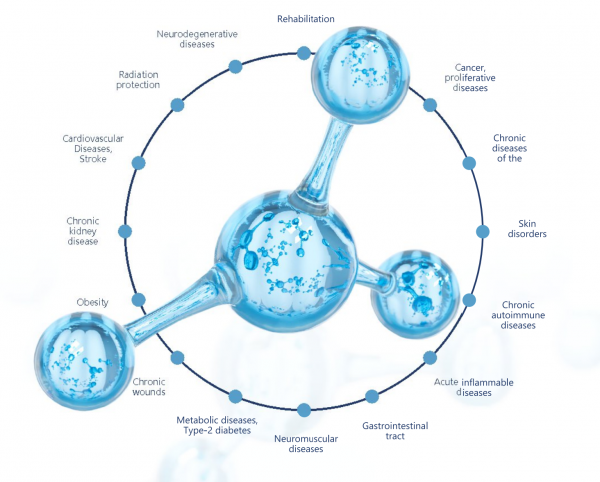

Get Our Exclusive Offer.
HYDROGENIX Hydrogen Water Machine Series
![7245-[Converted]](https://www.prithvigc.com/wow_media/2024/12/7245-Converted.jpg)
- Touch Buttons
- Advanced Technology
- Sleek Design
- Compact and Space-Saving
- User-Friendly Interface
- Energy Efficient
- Eco-Friendly.
- Durability and reliable
- Multi-Functionality
- Portable
| Specification | Description/Details | Specification | Description/Details |
|---|---|---|---|
| Product | Hydrogen Water Machine | Model | Hydrogenix X-Factor 1+ |
| Connection Type | Direct Connection to portable-water | Installation | Counter Top |
| Chamber Body | Tritan (BPA Free) | Cleaning | Automatic |
| Purity of Plates | 99.99% | Water Wastage | Zero |
| Chemicals | No | Structure | FDA Approved BPA Free Grade Plastic |
| Colour | White with black sides and silver valve | Hydrogen Content | Max: 1200 ppb Min: 1000 ppb |
| ORP (MV) | Max: -600mv Min: -500mv |
Power (Power Adaptor) | Input: Voltage AC (100-240) V Otput: DC 24 V 5A |
| Output Capacity | 1 Ltr/Minute | Operation Mode | Hydregen Water, Purified Water, Cleaning and ON/OFF |
| Mode operation time | Automatic cut-off system in 2 minutes on any button | Weight | Net:3.65 KG Gross: 4.5KG |
| Dimension in MM (HxDxW) | 323 x 140 x 280 | Warranty | 15 Months from the date of purchase Electolyzer modules – 36 months from the date of purchase |
| Cleaning Mode operation | 2 times per week or every 70 Ltd usage, cleaning must be done. |
Certifications


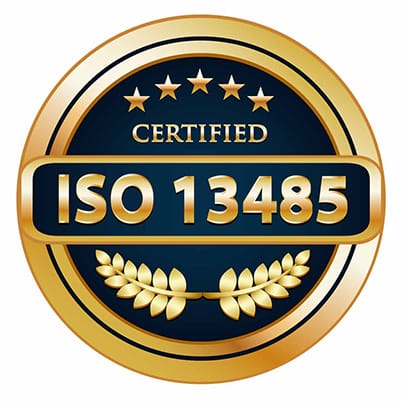
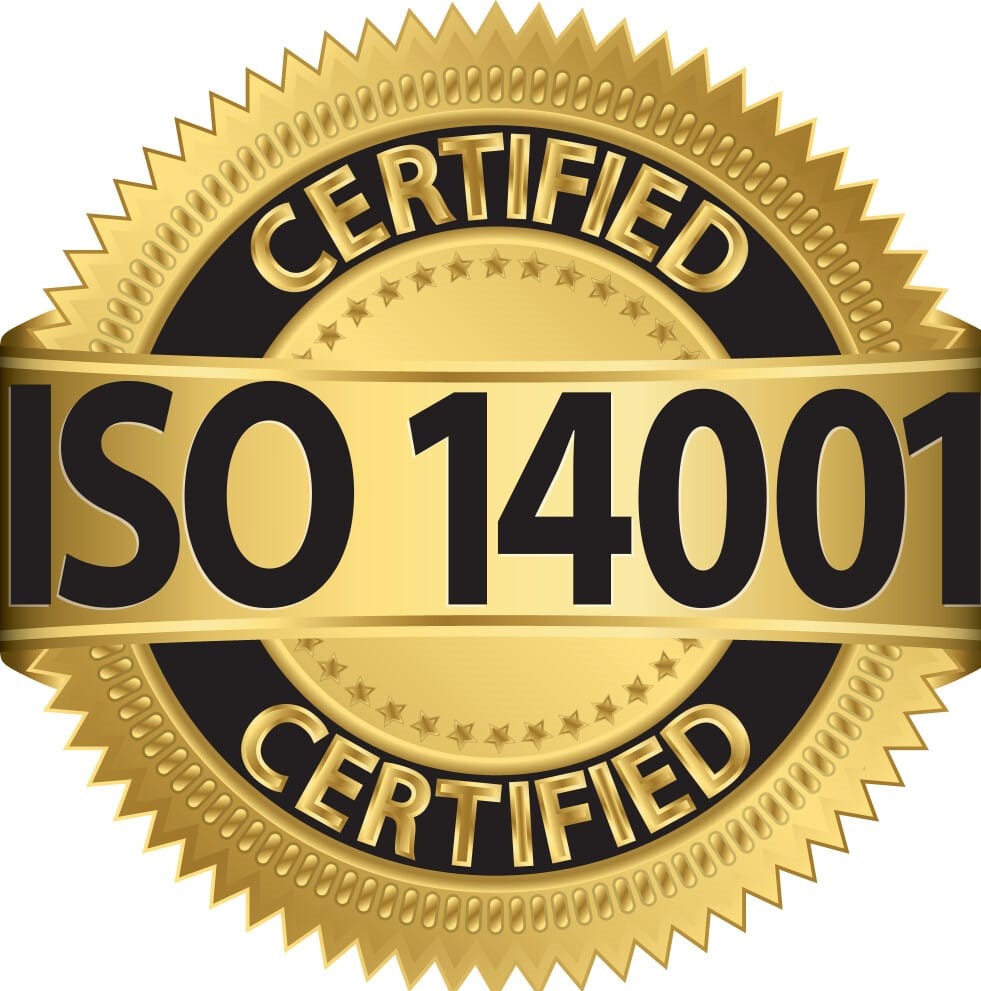

Get In Touch
Address
hydrogenixkerala@gmail.com
Call
+91-9633777200
Regular Use of HYDROGENIX Hydrogen Water Prevents These Lifestyle Diseases

Diabetes

Heart Diseases

Kidney Diseases
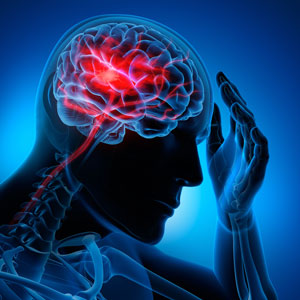
Stroke

Cancer

Obesity
HYDROGENIX CERTIFICATIONS
